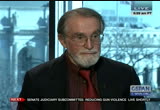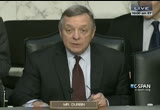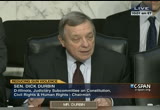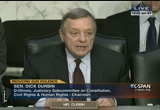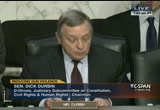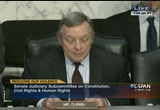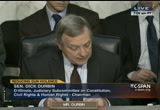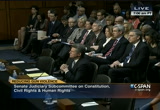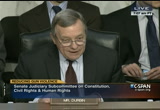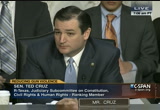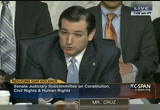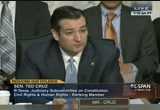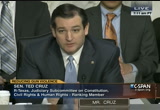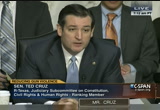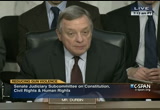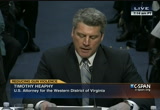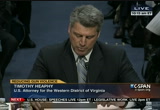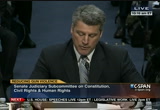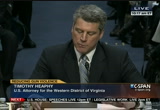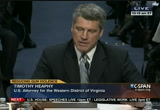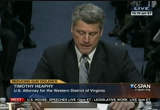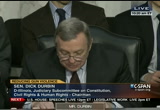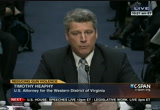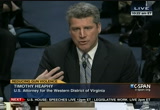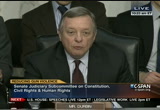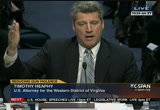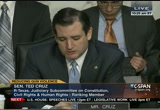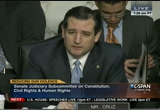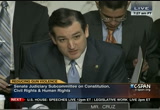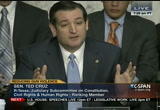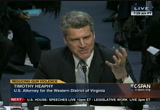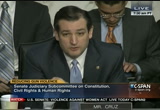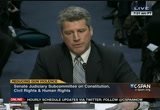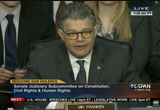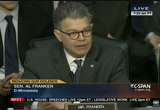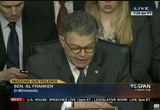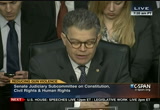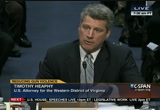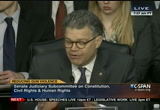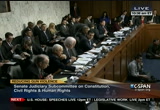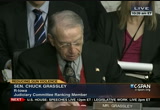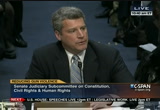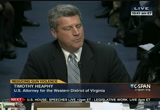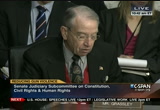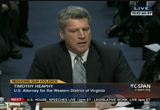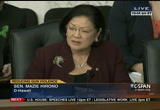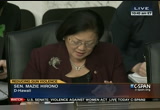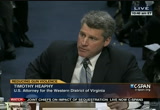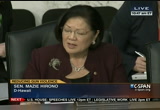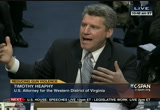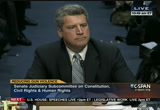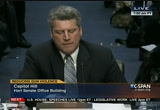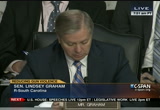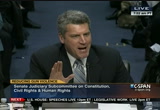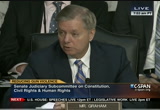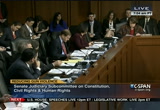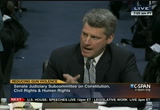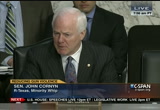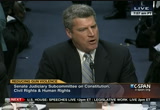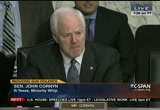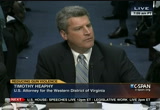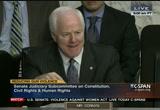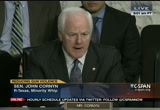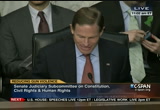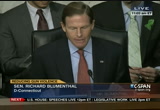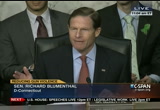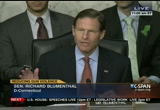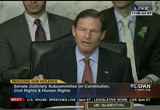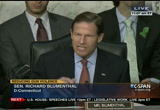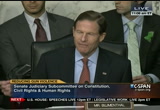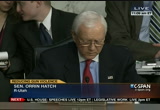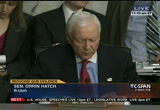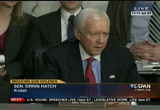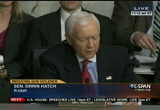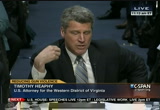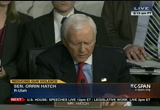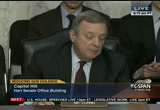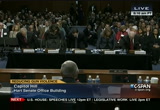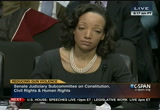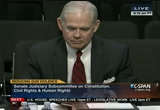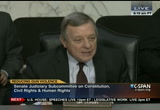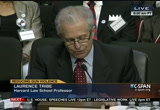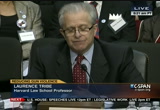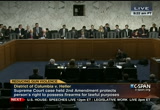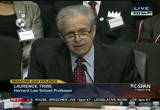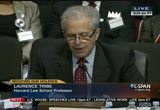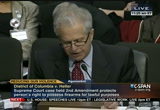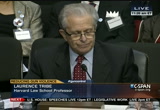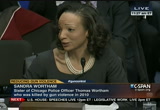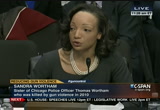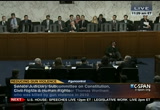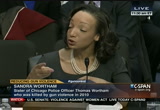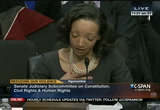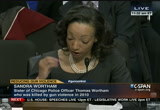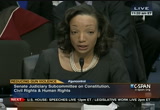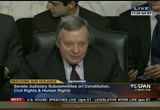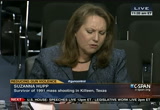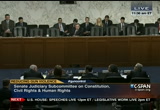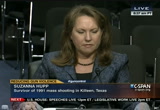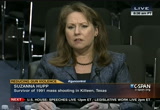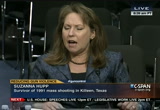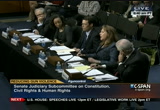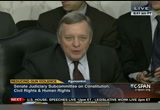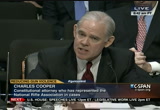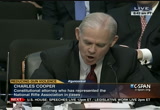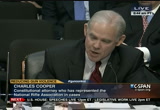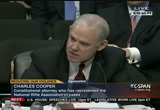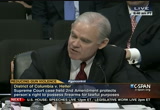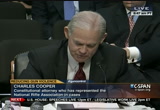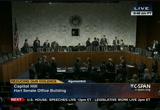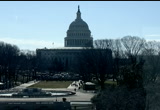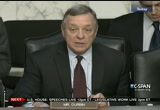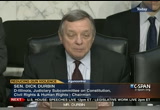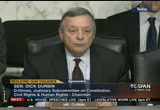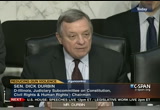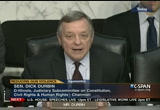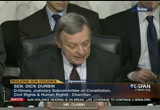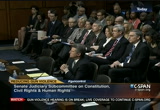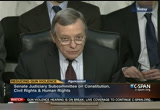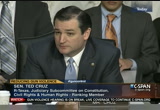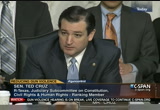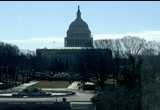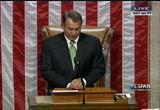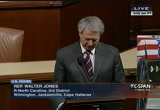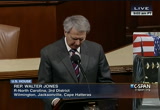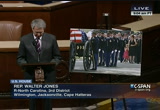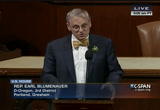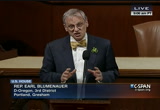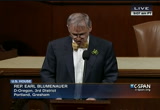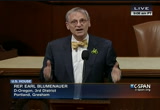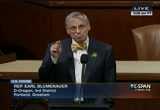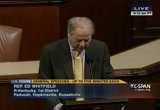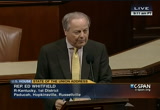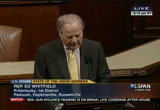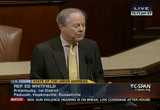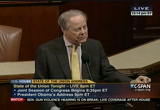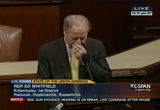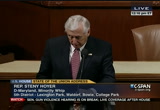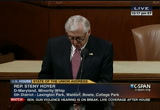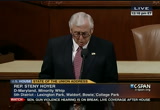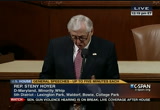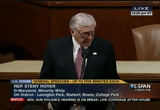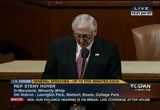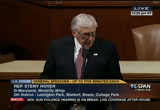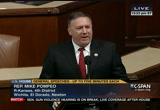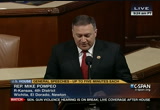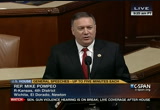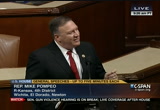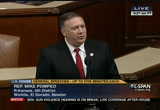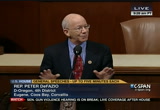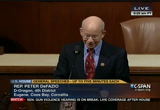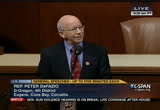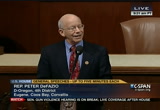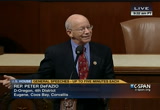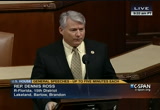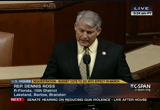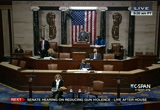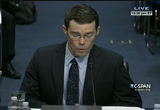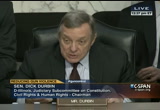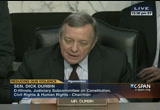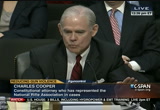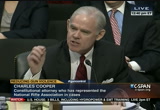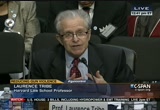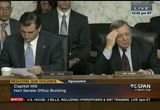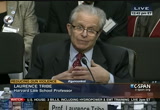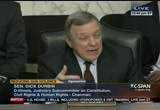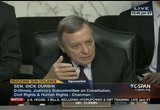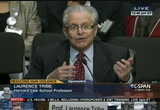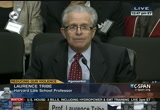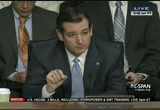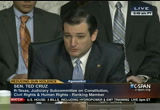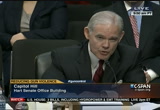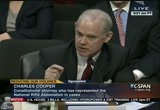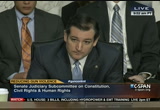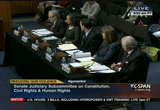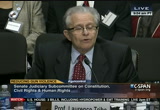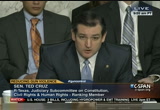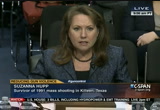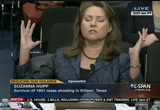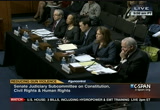tv Public Affairs CSPAN February 12, 2013 10:00am-1:00pm EST
10:00 am
became politicized very early. host: dr. torrey had an op ed in the "wall street journal." president kennedy made an initiative to move mental ellis and mental-health to a federal system. thank you for talking with us this morning, dr. torrey. he's the founder of the treatment advocacy center. we now go to a live hearing of the senate judiciary committee. [captioning performed by national captioning institute] [captions copyright national cable satellite corp. 2013] >> i want to thank the senator pat leahy for giving us the opportunity to have this hearing today. we are pleased to have such a large audience for the hearing. it demonstrates the importance of this issue. at the outset, i want to note that the rules of the senate
10:01 am
prevent outbursts or clapping or demonstrations of any kind during these hearings. there was so much interest in today's hearings that we had to expand opportunity for the audience in an adjoining room. the overflow room is 226 of the dirksen building. i will make opening remarks and give ranking member cruz the same opportunity and then welcome our first witness. we are here to discuss a critically important issue, maybe a very basic question. we venerate in this country are committed to the life, liberty, and the pursuit of happiness of those who live in america. we also guaranteed under our bill of rights the right to bear arms. can we make these two consistent? can we protect a person's right to own a firearm and still say to the rest of america we also need to protect your light -- you're right to life, peace, freedom from violence from those same firearms? according to the centers for
10:02 am
disease control, more than 11,000 americans -- 11,000 -- are murdered by guns each year. that is more each year than the lives lost in the tragedy of 9/11 and the wars in iraq and afghanistan combined. each year. every year, more than 30 men, women, and children are killed in violent shootings. 200 are shot and survived. numbers don't capture the deeply personal impact of a gun violence. there are too many families to face in ntc get a dinner table, too many parents to what has been empty bedroom, too many husbands and wives who have lost to the gloves of their lives -- is the love of their lives because of gunfire. it has become almost routine in this great nation. in park in chicago, in a nightclub in st. louis, illinois, in a movie theater in
10:03 am
aurora, colorado, a shopping center in tucson, arizona, a sikh temple in oak creek, wisconsin, and the college lecture halls in illinois and blacksburg, virginia, and a first grade classroom in s,wtown, massachusett americans all over the country are saying enough. we need to act. we need to better protect our families, our kids, our schools, our loved ones from the epidemic of violence. some say that we should just enforce the laws on the books, but that is not enough. there are so many gaps in these laws that we now they created the situation we face today. the senate will take up proposals to close those gaps and reduce gun violence. we will consider universal background checks for gun sales, tougher gun laws against illegal stock purchasing, stopping the flood of new
10:04 am
military-style assault weapons on to our streets, limiting the capacity of new gun magazines to a level that allows for reasonable self-defense but reduces the scope of carnage that a mass shooter can cause. all of these proposals are based on common sense. all of them have strong support among the american public. and all of them, i believe, are clearly consistent with the constitution, the second amendment, and the bill of rights. in the landmark supreme court decision in heller in 2008, the court determined that americans have the individual right to possess firearms for lawful purposes such as self-defense. but justice scalia, no liberal, writing for the court's conservative majority, made clear that the second amendment right is "not unlimited," and like other rights, it is subject to reasonable regulation. the heller decision makes pays not to cast any doubt on common
10:05 am
sense gun laws. over and over, gun regulation is described as "permissible," supported by historical tradition and "presumptively lawful." when given the opportunity to retreat from those statements in the 2010 macdonald case, the court instead reinforced the same statements and described them as "assurances." in hundreds of cases following heller, lower courts have upheld common-sense gun laws as consistent with the second amendment. there are some who continue to challenge the constitutionality of reasonable gun regulation, even though history, president, and the supreme court's statements in heller and mcdonald way heavily against them. they do so hoping that judicial activism will advance their no- compromise ideology when it comes to guns. i think we need to be careful. this is not some abstract legal debate. guns have forever changed the lives of so many people guest:
10:06 am
let me mention just a few of them. hadiya pendleton, and understood in an inspiration to our friends, all walking angel her cousin called her. she was taken from us two weeks ago. her family is here today a student at northern illinois university, with a warm heart and bright future, murdered in her classroom by a man with a history of mental illness. her mother is here today. blaire holt killed while shielding his friends from a gang members spraying fire on a city bus. his friend is here today marcus norris, hit in the face by a bullet that came through the wall of his house. thank god he survived. we are glad to have him here
10:07 am
today. a true american hero who dedicated his life to serving his country and his community, killed by gang members with a straw purchase gone. i attended his funeral service. the officer's family is here, and his sister will testify today. there are many more in this room today whose lives and families have been changed by gun violence. i would like to ask the friends and family of the victims of gun violence to please stand. look about his room. understand that the debate we have before us has affected so many lives. thank you all for being here today. as we conduct this debate and honor your loved ones who are no longer with us, we know that we have to act. thank you for joining us at this hearing. senator cruz. >> thank you, mr. chairman.
10:08 am
let me say it is a particular honor to serve as ranking member on this committee with you and a particularly high honor to serve on the committee with two former ranking members and chairman of this committee, senator cornyn and senator hatch, as well as the ranking member of the entire committee, senator grassley. all of us were rightly horrified by the tragedy in newtown, connecticut. to see young children senselessly murdered takes your breath away. let me say to each of you who has come here today that are the victims of crimes of violence, my heart goes out to you. thank you for coming, thank you for standing for your lost loved ones. i will tell you that i have spent personally much of my professional career working in a law enforcement to, number one,
10:09 am
prevent these horrible crimes of violence, and number two, to ensure that anyone who carries them out is subject to the very strict as punishments. i am hopeful that the fervor that we see on this judiciary committee hearing for standing up for victims of crimes of violence will carry over to issues other than gun-control guest: i am hopeful t that same fervo -- i am hopeful that that same fervor will be present when a judicial nominees are here, who have a record in history of allowing those who have committed violent crimes to walk free. i hope that same fervor on a bipartisan basis will be present when we're talking about how to ensure that the laws and resources are there to prevent a violent criminals from carrying out their horrific crimes and to ensure that every one of them receives a fair and just punishment.
10:10 am
in my view, the divide on this issue is fairly straightforward. the focus of law enforcement should be on criminals, and we should be unstinting in protecting communities, many of the communities that each of you have suffered losses in, communities that sadly, law enforcement has been failing. and we should be working to fix that problem. at the same time, i think that we should continue to respect and protect the constitutional rights of law-abiding citizens. it is often lost in the debate over guns that the second amendment is part of our constitution. it is part of the bill of rights, it is indeed, as justice joseph story put it, the palladium of liberty, a fundamental protection of every
10:11 am
american. in my view, stripping the constitutional rights of law- abiding citizens does nothing to prevent criminals from carrying out a violent crime. and indeed, the overwhelming weight of the empirical evidence demonstrates that when the rights of law-abiding citizens to protect themselves, protect their homes, protect their families are taken away, a violent crime increases, citizens defenseless are more horrible horrible to violent criminals -- more vulnerable to violent criminals. for that reason, the two cities with the strictest gun control policies, washington, d.c. and chicago, both of which for years had effectively total ban on firearms ownership, so it could not be possible to have a stricter policy, both of the sadly suffered from some of the highest crime rates and highest murder rates, notwithstanding
10:12 am
those laws. i would suggest in significant part because of those laws. if you look in contrast to jurisdictions that have protected the constitutional right to bear arms, you have consistently seen a lower crime rates, aser ratemurder individuals are able to protect their family. the supreme court decisions in heller and mcdonald were landmark decisions to they concern the question whether each of us is protected by the bill of rights, because the position of the cities of d.c. and chicago in that litigation was that no individual has any right whatsoever under the second amendment. the position of the litigants in those cases was quite extreme. today we are discussing what are the limits on that right, because the supreme court made absolutely clear that the second amendment is the constitutional
10:13 am
right of every american, and i would point out that constitutional rights are designed to be protected by just when they are popular, but especially when passions -- not just when they are popular, but especially when passions seek to restrict those rights. i look forward to this hearing underscoring the rights of the second amendment for every american. >> thank you, senator cruz. in keeping with the practice of the committee, the witness will please stand and raise the right hand to be sworn to do you affirm that the testimony you are about to give before the committee is the truth, poultry, and nothing but the trick, so help you god? let the record show that the witness answered in the affirmative. we are pleased to be joined by u.s. attorney tenness timothy h.
10:14 am
there was a request by the republican side it to send a witness to our next hearing on the importance of enforcement of the gun law. timothy heaphy was appointed as u.s. attorney for the western district of virginia. he has worked in private practice and taught at the university of virginia school law. mr. heaphy, thank you for joining us today. we will give you five minutes for an opening statement. your complete dimon will be part of the record. and then we will ask you questions. >> thank you chairman durbin, ranking member cruz. i am pleased and honored to speak with you about the continuing work of the united states attorney community and the department of justice to address non-related violence. this is a very person -- to
10:15 am
address a gun-related violence. this is a very personal issue to me. i've prosecuted hundreds of gun cases in my years as a federal prosecutor, including a yearlong trial of a violent drug gang right here in washington, d.c. akron to serve as united states attorney in a district that has felt the pain -- i currently serve as united states attorney and a district that has felt the pain of a mass shooting on the campus of virginia tech. victims of these horrible crimes, -- spoke to victims of these horrible crimes, and working with men and women to investigate them on the street. attorney general eric holder has stated that combating violent crime is a top priority of the department of justice. to that end, his task 93 state attorneys with the responsibility to localize strategies to apprehend, prosecute individuals, street gangs, and other criminal organizations that engage in gun-related violence. these local strategies require us to work smarter by gathering
10:16 am
intelligence and focusing our enforcement efforts on the most dangerous and complicated threats in our communities. we use that intelligence for vigorously prosecuting gun crime, relying on close coordination with agents from the bureau of alcohol, tobacco, firearms, and other state and local partners. we do more than arrest and prosecute. in communities where violence persists, we are forging partnerships for prevention organizations and supporting their important work. our strategy relies on a nationwide effort to keep guns out of the hands of prohibited persons. when licensed gun dealers run a background check on and every potential gun buyers, the ensure that they're not selling firearms to felons, domestic abusers, drug users, people with mental health issues. but the background check system is only effective if it contains all relevant information from every source. the department of justice is
10:17 am
working to create incentives and provide assistance to state governments, prime contribute is too deep background check system, to ensure that they put all relevant health records into the system. even if we find a way to get every record in, our effort to prevent criminals from getting guns is hampered by current holds in the background check the system writ of violent criminals often seek out sellers, whether at gun shows, the internet, with the yellow pages, who are not licensed dealers and not required to run the background check. extending the background check requirement to all commercial transactions, absent limited exceptions, is our best opportunity to keep firearms out of injures hands and keep our children and communities -- out of dangerous hands and keep our children and communities say. we worked closely with state prosecutors, local law enforcement officials, to determine if a particular gun
10:18 am
case or gun offender should be charged in federal or state court. when cases come to us, we use federal firearms statutes to prosecute prohibited persons who possess firearms, people who are prevented from obtaining a firearm due to an interception of the background check. we prosecute individuals engaged in the business of dealing firearms without a license or ignore la,. in gun sales to persons. we try to violent criminals -- charge of violent criminals with a range of other crimes, using statutes with often include lengthy mandatory sentences. additionally, we do what we can to prosecute cases involving trafficking and firearms, despite the enormous challenges that such cases present. there is no single federal statute for preventing a fire arms trafficking work stoppages in. this gap requires prosecutors to find other statutes, generally
10:19 am
paperwork violations, that can be applied to the particular trafficking scheme. without more meaningful penalties for those who traffic in firearms, we will continue to find it difficult to dismantle the criminal networks that exploit these statutory caps. i want to end by assuring this committee and the american people that the department's commitment to prosecuting is as strong as ever. the number of gun defendants charged by united states attorney's has declined slightly since 2005, but our number is significantly higher than in fiscal years 2000 to 2002. during the same period of time, the number of murders and other violent crimes has declined at a greater rate. our commitment to gun prosecutions has never wavered and has helped to lead to an overall decrease in violent crime. thank you again for the opportunity to appear before you today. i look forward to answering your specific questions. >> let me say a word about chicago.
10:20 am
it is a great city, but it is not an island. just outside chicago, in the suburbs, is a gun store responsible for 20% of the crime guns we confiscate in chicago. despite the laws in chicago, the fact that you can cross outside the city into the suburbs, go down state, neighboring states -- we found that 9% of the crime guns in chicago can be traced to the state of mississippi. we cannot deal with this in isolation, community by community. i want to deal with the issue of stop purchasing. start purchasing is a dangerous act that supplies criminals and other private purchasers with the guns. the primary statute used for charging penalizes a person who "knowingly macemakes a false statement material to a gun
10:21 am
assail." the straw purchaser checks yes on the atf form that asks if you are the actual buyer of this fire arm. can you talk about the challenge prosecuting the cases that appear to be paperwork prosecutions? >> yes. you are exactly right guest: when someone goes into a gun store and buys an arm on behalf of someone else, our hands are tied. we can prosecute that as a violation, but not what it is, and illegal stoppages of oregon. the statue that prosecutes a false statement on a firearm crime requires, a, evidence that the person knew he was making a false statement, and that is a difficult-hold for us to meet. prosecutions under that carries minimal sentencing guideline range.
10:22 am
fully 1/3 of the charges resulted in a not guilty verdict because largely of this standard. another 37% resulted in a sentence of less than a year in prison. the statute itself, even if we have evidence of specific intent to conduct a straw purchase, does not give as much heat on the back of end to get actionable intelligence. >> those who argue that we already have laws on the books, we just need to enforce them -- you are telling us that this is a week law. it is the paperwork prosecution that is not taken as seriously as the actual death that might result from the gun purchase. >> we are constantly focused on gathering intelligence on more serious patterns of crime. gun trafficking is no exception of it is essential for us when we address someone who is a straw purchaser to get actual intelligence about where the purchase is going.
10:23 am
the leverage we have to gain that intelligence comes from a significant penalty, and if the penalty essentially is a paperwork violation that is not intending, it is difficult for us to get work up the chain of the network. >> i have co-sponsored legislation related to straw purchasers did senator kirk, my colleague in illinois, senator gillibrand, they have a laws. do you think it would put a significant dent? >> yes, i do. it would give us the more severe penalties we needed to gain intelligence and build up the chain of network of individuals that conducted a straw purchases. >> we have heard in my state and other states that there is cooperation between state and federal prosecutors and allocating prosecutions, and many times, what could be an offense under either law is passed along to the local or state prosecutor's.
10:24 am
can you tell us how this affects the statistics on federal prosecution of gun laws? >> yes, senator. we have worked very closely with our state and local prosecutors. we do that in every district in the country. in my district in charlottesville, virginia, when someone is arrested with a gun, there is a conversation between myself and the commonwealth attorney in that jurisdiction, and we talk about whether it makes sense for that offender to be charged federally or under state law. since the virginia tech shooting, there are increased penalties for being found in possession. it is a jurisdiction where the state can prosecute as we can. it has contributed to the slight decline in our overall number of gun defendants. >> the last point i will make is that on march 1, unless something else is it done, there will be a sequester and a cutback in the department of
10:25 am
justice and the resources available for the prosecution of crime. about 1000 federal prosecutors may be terminated or at least reduced and service. i think the impact is obvious. would you like to comment on that? >> we are trying our best to do all we can with the limited resources we have as those resources diminish, whether they are prosecutors or agents, our job is made more difficult. those sequester cuts would be difficult for us to absorb. >> thank you. senator cruz. >> mr. heaphy, i want to thank you for being here for your service on frontline law enforcement. you are focused on bringing criminal laws to bear. it is criminally input and i commend you for that, sir. >> thank you, senator. >> i would like to address two issues that came up in your testimony. the first is the efficacy of gun control laws, the second is straw purchasers.
10:26 am
let's start with the gun control laws and do they work. are you aware of any service empirical basis for the proposition that significantly restricting the rights of law- abiding citizens to keep and bear arms actually results in reducing violent crime? >> sir, violent crime is down substantially from where it was but i think that is in part to vigorous enforcement -- getting guns out of the hands of violent criminals. i don't know that we are ever going to stop violent crime. unfortunately, the business in which i work will always be necessary. what we are trying to do is increase the barriers to the commission of the violent crime, make it more difficult for the firearms -- >> let me point out a couple of things. number one, your statement that a violent crime is down is a statement about national trends, and you are right, and i agree that vigorous enforcement of criminal laws targeting violent
10:27 am
criminals, that works. the question about stripping the rights of law-abiding citizens, however -- the only way to ascertain that is to engage in a comparative analysis of those jurisdictions that have done so versus those jurisdictions that have not. for example, if you look at cities, of the top six cities with murder rates, detroit, sally in 200 -- sadly, in 2001, topped the list. baltimore was second philadelphia, third. emphis, tennessee, the only one of these six without especially vigorous gun control laws, his fourth. chicago, illinois is 6. five of the six cities with the highest murder rates are among
10:28 am
those cities with the strictest gun control. if you contrast that to cities that do not have strict gun control -- for example, my hometown of houston, where there are nine murders per 100,000 people, that is less than 1/4 what detroit suffers under. you look at other cities in my home state of texas -- san antonio has 7 murders per 100,000 people. el paso has two murders per 100,000 people. that means detroit, the murder rate is 24 times higher than it is in all past. -- el paso. i would also point out that the argument that you and chairman were discussing about cities such as chicago not being isolated islands, that there are places elsewhere in the country where people can legally purchase firearms -- none of those cities i discussed, houston, san antonio, el paso,
10:29 am
are isolated islands. in the entire state you can purchase firearms. what we see with the murder rates is that the murder rates are consistently lower. my question to you, not your subjective beliefs, but are you aware of any empirical data -- every one of us wants to reduce murder rates -- is there any basis to say that stripping the constitutional rights of law- abiding citizens would result in decreasing murder rates rather than increasing them, which, unfortunately, is the pattern i think we're seeing? >> senator cruz, let me start answering a question by thanking you and this committee for expanding our discussion of guns beyond mass shootings to urban violence. i've spent my career working on urban violence issues. it is relevant to security. the fact that we're having this discussion about urban violence is much appreciated. like we are working on this issue is showing me that there is no -- my career, working on
10:30 am
this issue is showing me that there is no single factor driving this. this is a complicated issue of economic opportunity, health care tate is a complicated situation that breeds violence. tying a permissive gun laws -- >> with respect, if i could stop you, i would point out that for the record, given twice the opportunity to answer if there is any empirical basis for the idea that strict gun- control reduce violence, twice you have been unable to answer that. with straw purchases, that may be a potential area of bipartisan cooperation. the chairman brought it up, and we would agree that if there are those with criminal intent transferring firearms to felons, there should be strict punishment for that.
10:31 am
that may be a productive area of cooperation but i would point out that one of the largest straw purchasers we have seen in the last few years was, sadly, the united states of america in the fast and furious program, sent thousands of firearms and deliberately allowed them to go into the hands of a violent drug cartels, which were used to murder hundreds of citizens, it isn't citizens in mexico and at least one federal law enforcement officer -- innocent citizens in mexico and at least one federal law enforcement officer. has the idea of walking guns, the idea of allowing criminals to have illegal guns, would you characterize that as a typical law enforcement practice? >> senator cruz, the fast and furious operation has been the subject of considerable inquiry. our inspector general issued a lengthy report that found that mistakes were made. it is a regrettable incident and one from which we have learned.
10:32 am
we will continue to incorporate the lessons learned from that report. i want to go back to your question about emperor blevins. prediction -- empirical evidence. prediction or prevention of violence is not an exact science. it is difficult to find any individual factor, be it gun ownership, poverty, educational opportunity, is tied directly to murder rates. i understand your question. it is a good question. and i appreciate the focus on these murder rates. but it is a bit of alchemy to come up with a single factor with respect to reducing violent crime. >> thank you. my time has expired. >> senator frank and. >> thank you, mr. chairman, for holding this hearing. i want to thank some folks from minnesota who have been courageous in sharing their own stories of gun violence. mary johnson, angela, maya,
10:33 am
police sgt mike duzann i look forward to spending time with each of you tomorrow afternoon. i want to send my condolences to the people of oakdale, minnesota, who experienced a horrific shooting last night. i spent some time traveling around minnesota in the aftermath of the shooting in sandy hook, and what i have learned is that we can honor minnesota's culture of responsible gun ownership while taking some reasonable steps to make our communities safer. gun-control is a central part of this. i support a ban on assault weapons and a limit on the size of magazines. i also believe that we need to improve and expand our background check system.
10:34 am
billions of people because of our background check system have been denied guns. it seems like there is a consensus being built around the idea that we should do background checks on all purchases of guns. part of improving the background check system involves updating mental health records in the national database and, of course, improving access to mental health is an important part of this entire discussion, too. what we cannot do this stigmatize mental illness. what we must do is improve our way our country of people who live with it. if we are going to talk about mental health, let's make it more than just a talking point. that's making a true national truerity -- let's make it a
10:35 am
national priority. i would encourage all my colleagues to the mental health act, would improve access to mental health services for our children so that we can catch this early. i have talked to moms who have gotten professional help for the children that has not only changed their children's lives, it has changed their lives. i would just anchorage my colleagues to look at this piece of legislation. mr. heaphy, i asked the president's gun violence task force to move forward in implementing be balls down- deomenici -- domenici act, and i want to thank the administration for doing that. it is very important. the vast majority of people with mental illness are not violent,
10:36 am
but there is a small percentage who can become violent if they are not diagnosed and do not get treatment. i know that you put a special emphasis on community-based crime prevention projects since you have become a u.s. attorney. based on your experience, can you talk a bit about why it is so important for people to have access to mental health services in their communities? >> absolutely, senator. i can talk about this issue from the virginia tech experience. i served just up the road from blacksburg, and those wounds linder. they never really he'll. -- heal. one of the things we did in virginia on a bipartisan basis is change the way we captured mental health adjudications in the background check the system. virginia and now is really the gold standard for ensuring that respect for privacy, when folks are adjudicated by a judge or
10:37 am
civilly committed with mental health issues, those records are put into the national criminal background check. the shooter at virginia tech had a mental health issues, but unfortunately the records were not. we have to focus on this issue of, as you said, increasing access to treatment for those who neede it. many states, unfortunately, have not followed virginia's lead and have not put those records in. that is one of the hold on the background check system. the department has supported grants to states to ensure full compliance. the records need to be comprehensive. but it goes all the way back to making sure that the treatment is available. that is a crucial component of public safety. >> thank you. my time has run out. just let me emphasize this for everyone listening. the vast majority of people with mental illness are no more violent than the general
10:38 am
population. in fact, they are more often the victim of violence than the general population. but -- but there is a very, very small minority of people with mental illness who can become more violent if they are not diagnosed and if they are not treated. we can catch those people earlier, we can identify them, and we can perhaps prevent some of the types of things we have seen lately. ->> we have an early part rule on this committee did -- early bird rule on this committee. the next senator is senator grassley. >> thank you, mr. heaphy. as a follow-up to the question on straw purchasers, all too often law-enforcement events
10:39 am
enforcement on straw purchasers, a decline for one reason or another. how many cases were presented to u.s. attorneys for suspected straw purchasers last year that were declined prosecution? >> senator, i don't know exactly protecting get that information for you, but i don't have a specific -- i don't know exactly. i can get that information for you, but i don't have a specific number. >> i will appreciate your answer in writing. thank you. the title of today's hearing is "proposal to reduce gun violence -- protecting communities while respecting the second amendment." your testimony makes no mention of the second amendment, so, question -- has the department of justice taken any position on the constitutionality of the second and then on legislation pending before the senate that
10:40 am
would ban so-called assault weapons? >> the department of justice and the administration understands the impact of the heller decision, which found that americans have a fundamental second amendment right to self- defense but i believe that the heller decision admits reasonable restrictions on that right. without opining on a specific measure, one of the bills, whether a is or is not constitutional, i believe there are ways to regulate guns respectful of the second and then in -- second amendment. >> the department has not provided a position on this is of legislation. you know why they have not taken a position yet? >> the department supports an assault weapons ban and will ensure when it comes out that it is constitutional. >> the court provides for
10:41 am
heightened scrutiny of law on the second amendment. >> the district of columbia statute at issue in heller impinged on that because it was an absolute prohibition of firearms in the home. it is not go beyond that with the right to carry firearms anywhere. scalia in the heller opinion did admit it would be potential limitation on the right when time, place, manner, and restrictions are part of that overall right to self-defense. this spot between defending the second amendment and doing what we can to minimize the public --ety, that that's prevented presented by these -- the threat presented by these dangerous weapons. >> what basis is there to determine whether the ban is
10:42 am
constitutional or not? >> i am not familiar enough with the opinion to give an opinion on that. >> i would like to ask your question on fast and furious, but i'll want to also state that when he said policies have been changed, i have an e-mail to u.s. attorneys. as i said on the call, to avoid any potential confusion, i want to reiterate department policy. we should not design and cover operations which include guns crossing the border -- designed undercover operations which include bands crossing the border. the policy has not been changed about correcting licensed gun dealers to -- is encouraging licensed gun dealers to sell guns. it is only that they are ordered not to do it if they no they are going to cross the border.
10:43 am
it seems to me to be kind of just a conflict of policy for people in government to say that we ought to ban certain guns and at the same time you are having licensed gun dealers in carriage to sell guns to people illegally. -- encouraged to sell guns to people illegally paid regarding fast and furious, as u.s. attorney, would you support atf encouraging federal firearms licensees to sell firearms to those they suspect of being straw purchasers? >> we learned a lot from fast and furious, and the emailed you are refering to encourages us to monitor all the undercover operations. there are cases when they and of criminal activity, and that is a dirty reality of our business, that we have to at times,
10:44 am
working with our agents, work with people involved in criminal activity. on a problem with fast and furious was insufficient scrutiny up the chain. we hope that since we have learned lessons from that, we will do a better job of protecting public safety with undercover operations. >> my time is up. >> thank you, senator grassley. senator hirono. >> i would like to thank the family and friends of victims of gun violence with us today. this is a critical issue for our country and our communities. to our testifier, you mentioned that the department supports a stand-alone straw purchasers statute. do you also supports closing and other new poll, the purchase at daw -- closing another loophole, purchasing of guns at
10:45 am
gun shows? >> yes, senator hirono. currently it is too easy for prohibited persons -- felons, but domestic abusers, those with health issues -- to evade the background check requirement. they can walk down the street, go to a gun show, and with no background check walk out with a gun. that is a gaping hole in the system. we strongly support increasing to effectively a universal background check system. it should in it for a limited exceptions -- intra family transfers. but commercial transactions ought to be run through this system. >> we have had a discussion this morning regarding the correlation between tough gun- control laws and violent crimes at places such as washington, d.c. and chicago. i am using facts and evidence
10:46 am
to -- i am all for using facts and evidence to inform our decisions. but the conclusions we draw from this information that can be very problematic and questionable. for example, hawaii has pretty strict gun control laws, and yet we would have, i would say it, very low, knock on wood, gun violence crimes in hawaii. i don't know of any empirical evidence showing the cause and effect between a weaker gun laws and fewer gun of violent crimes, unless you are aware of any such empirical cause and effect studies. >> senator, i've worked on this issue for 20 years and, again, spent time with the victims, spend time with killers, people who have been involved with these acts of violence and are hoping for some leniency cooperating with us. i cannot say i know what causes
10:47 am
gun violence. i wish we did. there is no more pressing problem to me and my colleagues in the department than in this. but unfortunately, it is a complicated, layered, textural problem that has so many different factors. it is very difficult to isolate one cause and tie it specifically to violent crime rates. >> had you had any experience with bullying in our schools leading to violence? we had a police officer, or police captain, i believe, who testified before the full committee saying that he considered bullying in our schools that could lead to violence, that could lead to the easy up attainment of guns, and that could lead to tragedy is, and he acknowledged that as a concern. have you had experience in this area? if so, what can we do to prevent bullying in our schools that could very well escalate? >> i appreciate that question, because it gives me an opportunity to talk about a more
10:48 am
comprehensive anti violence approach. we cannot just arrest people and think that we are going to have a safer community. we have to do what we can on the front end to prevent potentially violent criminals from getting guns and from perpetrating those awful acts. bullying is part of that, absolutely. we have to do what we can to prevent and provide resources for people who are believed. every u.s. attorney is trying to implement a very localized, please-based anti-violence strategy. in some communities, our prosecutors, particularly in the civil-rights division, have done a lot of work on anti-bullying programs and have people appreciate the unfortunate consequences of school bullying. yes, there are stories, very difficult stories, where bullying has prompted someone to violence. our approach to this problem has to be 360 degrees. it cannot simply be let's charge
10:49 am
people who commit shootings after the fact. a pass to contemplate what we can do it in advance to prevent those things from happening. >> thank you very much. >> thank you. senator graham. >> do you own a gun? >> i do not. >> do any of your friends own guns? >> yes. i live in state court bonds are held in high esteem. but i have young children -- >> i understand. you're certainly right to make that decision. if i wanted to buy a shotgun, could i do so without going through -- if senator cornyn and i wanted to buy a shotgun, but i do so without going for a background check? >> you are exchanging a gun?
10:50 am
>> yes. would you agree with that exception? it would be a waste of money. >> i think there should be limited intrafamily transfers that should be exempted from the background check. >> you have not answered my question. john and i went hunting a few months ago, and he has a better shot and then i asked under the regime -- he has a better shot and then i have. under the regime proposed, what i have to go through a background check to buy his shotgun? >> i am not familiar with whether that would require the checked. >> are you familiar with a scenario where a law-abiding citizen might need more than 10 rounds to protect their family? >> it makes it easier for
10:51 am
individuals to commit grievous acts of violence. >> to you agree that mentally ill people should not have more than one bullet? >> yes. >> do you agree that there may be mothers who need more than six? >> we need to be respectful of people's right to defend themselves -- >> the point is that i can envision a situation where, like in atlanta, someone broke into her home and she shot the guy 56 times and he was still able to get up and out the door -- 5 or 6 times and he was still able to get up and out the door. i don't think criminals will be limited by any capacity magazine size law, and if you start restricting the amount of the tent-shot limit in some circumstances, that may disadvantage law-abiding citizens and not do much of the criminal. -- to the criminal.
10:52 am
on the number of people are prosecuted, how many people a year fell back on track? -- failed a background check? >> i believe in 2012 it was 80,000. >> how many were false positives? >> a small percentage. i am not certain but when you say "false positives," what you mean? >> you are entitled to a gun but the system kicks you out. do you know the percentages? >> it is a small, but i cannot give you a specific figure. >> do you believe that the best way to discourage criminal conduct is to make sure the prosecution is swift? >> it is part of it. whether it is best, i am not certain. >> senator franken mentioned
10:53 am
doing something about mental health and i agree with that. i was a prosecutor in my younger days, and if you knew you were likely to get caught and the punishment was severe, there was a good deterrent. do you agree? >> absolutely, yes. >> of the 80,000 who fail back contracts, what percentage gets busted? -- who failed background checks, what percentage gets prosecuted? >> a small percentage. last year it was 44 cases. >> 44 is what percentage of 80,000? >> a very small percentage. lawyers don't do math well. [laughter] >> congressman don't, either. we're talking about expanding a system where the current system is 0000. something.
10:54 am
i think we have our priorities wrong. >> senator feinstein. >> thank you for allowing me to sit on this subcommittee. as you know, i am not a member. thank you for your measured responses. it is very much appreciated. i would like to put in the record a letter written by the mayor's against illegal guns, signed by the mayors of boston and new york city, supported by 850 mayors of both political parties all wrapped in this country supporting the assault weapons -- all around this country supported the assault weapons legislation and the ban on high capacity ammunition clips. there are very good quotations in this letter. i will not take the time to read them now, but as a former mayor, what happens on the
10:55 am
streets, so i'm grateful for this endorsement and support. mr. united states attorney, to the best of my knowledge, the assault weapons legislation which existed from 1994 to 2004 was never struck down by any court in the land. is that your information as well? >> is, exactly, senator. >> do you believe it was constitutional? >> yes. >> do you believe is possible to draft legislation which is reasonable which exams over 2000 weapons -- exempts over two dozen weapons but specifically concentrates on weapons designed for military use? >> i believe it is possible to craft a law consistent with the second amendment and held a decision that would be constitutional -- heller decision that would be
10:56 am
constitutional. >> 20 co-sponsors and myself have drafted this legislation. i would like to ask that you take a look at it, and if you have problems with it, did you let us know. >> i will, senator. >> thank you very much, and thank you, mr. chairman. >> senator cornyn. >> thank you, mr. chairman. mr. heaphy, thank you for your service as a u.s. attorney in for being here today. want to join the other members of the committee in expressing my gratitude to the family members who are here today who have lost a loved one as a result of an act of violence. i believe we owe it to you not to engage in tokenism or symbolic acts, but rather, to try the best we can to address the causes and to come up with solutions, and at the same time respect the rights of law-
10:57 am
abiding citizens to keep and bear arms is protected by the second man i -- second amendment. i believe is possible for us to do that. but i also believe it is important for us to look at the laws already on the books. there is already some discussion on this, and mr. heaphy, forgive me if i repeat it. in 2008, congress passed a provision that required that the states included in the background check database, people who were adjudicated mentally ill -- you are familiar with that law, are you, sir? >> senator, i believe that is voluntary. we strongly encourage them, but unfortunately, it is still voluntary. >> why in the world would be made that optional?
10:58 am
toi don't know a bit we need ensure that is relevant records are in the background check system. >> mind standing is that it is not being complied with -- my understanding is that it is not being complied with. about 1.2 million records have been forwarded for inclusion in the nics criminal background check the system. that is largely the result of about 10 state efforts, and i am glad to say that texas is one of those that at the -- that has the second-highest rate of sharing in the nation. don't you agree that it would be important to have individuals adjudicated mentally ill to have those records in the nics background data base? >> absolutely. i strongly agree with that. >> if the law is not mandatory
10:59 am
now, do you agree it should be mandatory, and if it is not in force, do you believe it should be enforced? >> i believe the way it is structured is that the attorney general holds aid to state law enforcement is states are not complying and putting mental health records in the system. there are incentives to do that, but as you said, it is spotty and not everyone has the texas approach and puts the records in. >> do you think it would be more reasonably calculated to protect innocent victims of gun crime and other actions that may be more symbolic and nature? >> i am not sure what would be more or less reasonably calculated, but i am certain if we don't have all relevant records in the system, it undercuts the effectiveness on the background checks. >> i cannot resist asking you about this again -- people who
11:00 am
live on background checks, the record of prosecuting those individuals is -- lie on back out checks, the record of prosecuting those individuals is we need evidence to prove a crime was committed. if there was a mistaken -- statement on the form -- the common defense is i did not know. i did not know there was something in my background. that is sometimes credible. they can get the same weapon at a gun show without submitting a forum. >> to say i have no conviction. >> the fact that it was false is not enough.
11:01 am
it is a difficult case to prove. 37% result in a sentence of a year or less. the gun background check worked there. we focused on people that obtained firearms and used them. >> i know the u.s. attorney's office has limited resources. you have to play our doors -- you have to prioritize. i see my time is about up. i appreciate one of my constituents here today. she has a chilling story about losing her parents in an episode
11:02 am
of mass violence in 1991 she has some important testimony for the committee. >> thank you, senator cornyn. >> thank you, mr. chairman. i want to express my appreciation for holding this hearing. i want to thank you for your extraordinary service in one of the busiest districts in the country. i had your job several years ago and that was one of the best jobs i ever had. thank you for your excellent service. i want to thank the newtown families that are here today.
11:03 am
i want to express my regret at a statement that was made i think within the last 24 or 40 hours by lobbyists for the national rifle association who said his group was hoping that the "connecticut effect" would pass so that his group could be more effective in its lobbying. their presence today and tonight at the state of the union i think is a statement and a picture worth 1000 words that the connecticut effect will last and it will be a call to action. then ra lobbyists, and -- the nra lobbyist comment was
11:04 am
callous and i call on the nra to reject it. i think it is an insult to all of us in america and to the 26 families in newtown that directly suffered this loss. you're a law enforcer. >> i have been a career prosecutor. >> i appreciate you coming before us in that capacity. folks talk about existing laws. you often know that a crime has been committed and you know who has committed it, but you need more than that knowledge on your part. you need evidence to go into court and prove that. when the nra says that there
11:05 am
hasn't been enough prosecutions, very often the reason is you do not have enough evidence. >> that is sometimes correct. >> we should do everything possible to enable more effective prosecutions under existing laws and under any new laws but focus on enforcement. let me ask you about the ban that currently exists. people who are seriously ill. right now with respect to a very large number of fire arms purchases, about 40% in private sales or so-called gun shows
11:06 am
sales, you have no way to get the evidence to enforce the existing law. >> we have no evidence. >> the current law prohibits purchases of ammunition to those same categories of people. do you have any effective way of enforcing that law? >> it is to easy to get around the background checks. those guns are used with regularity our streets. >> the same is true with ammunition. there are no ammunition -- background checks whatsoever. you have no practical way to
11:07 am
enforce that law. >> that is right. >> let me ask you about the second amendment and i think you have done a great job of describing that balance that applies to all constitutional rights. very often constitutional rights butt against each other. >> that is life in a democracy. >> it manages to reconcile fundamental rights that sometimes art intentioned. >> that is right. >> these proposals that have been made for reasonable regulations are perfectly consistent with everybody's
11:08 am
right to have they done, go hunting because reasonable regulation are consistent and the genius of our constitution. >> just exactly right. the president and attorney general respect the second amendment and are not trying to remove the basic rate for people to own firearms. we are trying to tinker with the balance. >> nobody has suggested that a criminal, convicted felon or drug addict or somebody mentally ill or a domestic violence
11:09 am
abuser has a fundamental second amendment right to have a firearm. >> those act from their past remove the second amendment right to own a firearm. >> or to purchase ammunition. >> thank you, mr. chairman. my old friend and debating partner, professor larry tribe. happy to have you here. i want to make an observation. you said heller allows restrictions. he said you did not read the whole decision. the assault weapons ban is not a restriction but an absolute ban.
11:10 am
i wanted to make that clear. the senator from california indicated the assault weapons ban was never stricken down as unconstitutional. the fact of the matter is that expired before the heller decision. so who knows what would have happened if it was tested? the senator may be right on that. you've been an excellent witness and want to thank you for your career. the department of justice focuses on prosecuting people who evade the back rent check system and acquire weapons
11:11 am
illegally. they did not focus those who attempt to purchase firearms but were unsuccessful. criminals do not walk into a gun shop to buy weapons and submit themselves to a background check. they get them on the streets. >> that is exactly right. >> the people least likely to be caught by a background check. some on our side wonder why do we raise all this fuss about background checks when we have them in existence. i'm sure you're familiar with project that was launched in 1997 in richmond, virginia.
11:12 am
it was an effort to enforce existing federal gun laws. residents were put on notice and all violations of firearms laws would be prosecuted. defendant's face five-year mandatory sentences. 372 persons were indicted and 440 guns were seized. richmond realize a decrease in homicide and a 41% decrease firearm homicides. of any plans for similar efforts to enforce existing gun laws?
11:13 am
>> exile was very successful. take a great model for a working partnership. the attorney and atf and richmond police came together to focus on violent crime. was a huge disparity and that disparity has changed. more of those cases go prosecuted at the state level. there will get every bit of a sentence as we could get in a federal court. st. louis, illinois, has seen a spike in prosecutions. state and local authorities came together and decided we have to do something about east st.
11:14 am
louis. that has led to an increase. we're still doing exile-type programs. >> each of the killing tragedies in newtown or aurora or columbine. they were able to use their weapons of choice and passed background checks or avoided it. each time politicians say it will never happen again and they call for passing more laws. simply putting more loss on the books will not prevent individuals who are ill or evil from harming others? >> i wish i could assure this committee that we could pass a
11:15 am
law that would prevent -- we cannot do that. there will be dangerous people that continue to perpetrate acts of violence. we are trying to create more roadblocks. it is not going to be perfect. we are trying to make it more difficult. >> you have been an excellent witness. thank you, mr. chairman. >> thank you for your testimony. i will send you some follow-up questions. i like the second panel to please come to the table. the justice department is asking to put in letter into the record about the working relationship with our witness in the first panel, mr. heaphy.
11:16 am
some senators have other meetings they are attending. on the floor of the senate, have votes on the violence against women act and several amendments. orope we're not interrupted stopped but that would be the only reason. we have for a business that has to be taken care of. i'll ask the witnesses at the table to stand up, if they will. >> is your right hand please. your firm your testimony will be the truth, the whole truth, and nothing but the truth? >> the witness's answer it in the affirmative. i will read a brief background
11:17 am
on each of the witnesses. laurence tribe is the carl m. loeb university professor at harvard law school where he has taught since 1968. he has written over 100 books and articles. he clerked for the california justice and potter stewart. i will give him the floor after i introduced the other witnesses. our next witness is sandra wortham. she is testifying in a personal capacity today. she is responsible for the domestic violence-related training and work as an attorney it court ofrcus cour
11:18 am
cook county. thank you for being here. our next witness will be suzanna hupp. she served as a member of the texas house of representatives and is the author of "one woman's fight against gun control." she graduated with a degree in chiropractic medicine. thank you for being here. our next witness is charles cooper with cooper & kirk. he worked in the justice department civil rights division and in private practice. he received his law degree from the university of alabama. he clerked for justice
11:19 am
rehnquist. last will be daniel webster. professor of health policy and management at johns hopkins school. he published over 70 articles and scientific journals which focused on gun violence or youth violence. his master's in public health from the university of michigan and his doctorate from the johns hopkins school of public health . we are having a changing of the guard. i hope they can leave any quiet manner. i know you made a great personal sacrifice to be with us here today. the floor is yours. >> thank you, mr. chairman.
11:20 am
members of the committee, i am honored by your invitation that i testified. it is humbling to be here in the presence of so many victims of senseless gun violence and many others who have lost loved ones. when we recall the horror of learning that 21st grade students were slaughtered, every four days nearly 20 more children and more than 100 adults died in gun homicides around this country. we may not know their names but they were not anonymous or invisible to those who love them and will never hold them in their arms again. the question is whether sensible
11:21 am
measures to reduce rampant gun violence, the violence that cut short all these lives is beyond our reach because of the second amendment and my answer to that is no. nearly every constitutional expert including judge robert bork treated the second amendment as irrelevant to any personal rights to keep or bear arms. by the end of the last century, a different understanding has emerged, one focusing on individual self defense. i supported the new understanding and the supreme court made it the law of the land in 2008 and 2010.
11:22 am
two decisions demolish the slippery slope theory of those who oppose all firearms regulations on the views that once we permit new regulation at all we will be in fighting the government step-by-step to come ever closer to disarming the people, leaving only the police and military with firearms. the supreme court took stern policy choices off the table and cleared the path for reasonable regulations to be enacted without fear those choices would open the door to a limited government control or be in peril by exaggerated interpretations of the second amendment. "there is no longer any basis for such doomsday proclamations." justice elliott said it at the
11:23 am
end of this opinion -- justice scalia said it at the end of his opinion. the court was explicit in saying what some of those tools include. they include conditions and qualifications on the transfer of firearms to keep them out of dangerous hands. they include long standing measures to keep firearms out sensitive places. they include complete bans of firearms that are "not typically possessed by law abiding citizens." and firearms that are dangerous such as m-16 rifles and the like. they include other regulations
11:24 am
designed to protect public safety without cutting into the core rights that the second amendment protects. those other regulations encompass bans on a little straw purchases and gun trafficking, both of which can frustrate any system of background checks for gun regulation. universal background checks or registration systems. since since with loopholes and less than universal coverage are calculated to be invaded by the very people who have no -- people we cannot entrust with those weapons. ones that do not trip the second
11:25 am
amendment's trigger have to include bans on high-capacity magazines and on lethal weapons that someone can keep firing for 10 rounds or more without reloading. banning those weapons is people a chance to escape and is the police a chance to interrupt the slaughter. it also covers bans on weapons designed for military use rather than for lawful civilian uses. the court did not say such regulations would survive second amendment scrutiny. it said heller would not even " cast a shadow of doubt on such measures should they be considered in the future." it's will completely solve -- should not think this will solve the epidemic of gun violence in america.
11:26 am
more will be needed. pilot video games, fell most that will far -- films that glorify murder and mayhem. we'll have the blood of innocent human beings on our hands and will be searched the constitution in the process. our constitution does not make the perfect the enemy of the good. it is not a suicide pact that condemns us to paralysis in the face of a national crisis of domestic bloodshed. thank you very much. >> thank you. sandra wortham. >> good morning, chairman
11:27 am
durbin. t an honor to speak today -- it is and honor to speak today. i am an attorney. i would like to talk about life and the impact this has on me and the families here today. i like to go back to may 19, 2010. i was having a good day. i went to line-dancing with my mother. we went out and had a good time. i got a call from my mother on my way home. that's not unusual. this call was different. said, "sandy, come home."
11:28 am
"they tried to rob him." we were raised in a good family. our parents taught us we could do anything or be anything. we had a responsibility to the community. that is how thomas lived his life. of duty intours iraq. he was also a police officer. earlier that we, thomas traveled here. then he traveled to new york city to run into a race in honor of a police officer who had been killed the year before. on that evening, thomas had gone
11:29 am
to my parents' house to show them pictures of police week activity. he finished and they ate dinner and he went to leave. my father went with him to the door to watch him out. two men approached thomas as he went to go on his motorcycle. thomas was a police officer and so he was armed. he told them he was a police officer. my dad was also armed. went in the house to get the gun. there was gunfire and between the offenders and my brother. i got the call and i had no idea how bad this was. i knew i had to get home.
11:30 am
ahead of me, other was stopped. -- traffic was stopped. i got out and started to run. and ambulance past me. i was running down the street. it was like a movie. i know now that thomas was in the ambulance because he was shocked. --he was shot. i got to the house. we waited and prayed a lot. thomas died. i did an interview at the week before because there had been two shootings across to my house. in the interview, i will read the direct quotation.
11:31 am
"when people think of the south side of chicago, they think violence." he went on to say that, "we are going to fix it." we still believe we can fix it. this hearing has been called in ways we can protect our communities. i'm so sorry that some people left. i am confused as to where we're having disagreements about this. to me, this is not about taking away the lawful right to own guns. people.t anti-gun that is how i was raised. but they were trained.
11:32 am
i respect the rights provided by our constitution. find it hard to believe our founders-- it is not about the right to lawfully own guns. this is keeping guns out of the hands of people like people who killed my brother. they would not have been able to get guns at a gun store. they bought the guns on the street. they're gonna do not arrive in chicago on its own. it was traffic from a pawnshop in mississippi. a gun trafficker went to mississippi and bought multiple handguns and brought those guns to chicago to sell to gang
11:33 am
members. that is a huge problem we're talking about. i cannot accept that we cannot fix that problem. many, many criminals obtain their guns through street purchases and we have an opportunity to address that problem. law-abiding citizens should not be disturbed by the proposals here today. we speak about the constitution and all the rights afforded by the constitution, we should remember the words of another document. we talked about life, liberty, and the pursuit of happiness. those things were taken away from thomas when he was 30.
11:34 am
we talk about lawful gun ownership. my brother and father owned a gun. that did not prevent thomas' murder. i think in excess pro-law abiding citizens. any one law to say would have changed what happened to thomas. i think we can do better. this is about our country. we have a system to affect change. thank you. >> thank you for your testimony. i still remember your brothers service. was an amazing individual.
11:35 am
it is sad that we lost him. thank you so much. miss hupp? >> i am speaking for myself today. i wanted to mention when you opened the proceedings, you ask all the victims of gun violence to stand and i hesitated. i don't view myself as a victim of gun violence but of a maniac who happen to use a gun as a tool. i view myself as a victim of the legislators at the time that left me defenseless. that is why i hesitated. i did not grow up in a house with guns. i was given a gun and taught how to use it.
11:36 am
i had a patient in houston and he convinced me to carry the gun, cho at that time was illegal in the state of texas. "you need to carry the weapon." several years later my parents and not when to have lunch with a friend of mine. we had finished eating when this guy drove a pickup trucks and became crashing in and ended up 15 feet from us. we thought it was an accident. then we heard gunshots. my father and i got down on the floor and turned the table up. the shooting continued. at that time in 1991 we were not
11:37 am
seeing mass shootings. i thought maybe it was a hit. but the shooting continued. it took 45 seconds to realize the guy was simply going to walk around, take aim, pulled the trigger, go to the next person, take game, pulled the trigger. he was executing people. i thought, i have this guy. i reach for the purse. he was up. everybody else was down. i had made the stupidest decision of my life. i began leaving my gun in my car. i didn't want to get caught with
11:38 am
my gun. i remember thinking, "what do i do now?" my dad said, "i got to do something." he went at the guy. a man with a gun in a crowded room has complete control. my dad covered half the distance and the guy turned and shot him in the chest. one that went down about 7 feet from me. he was still alive and still conscious. saw the wound and basically wrote him off. the gunmen went off to my left.
11:39 am
somebody broke out a window. i heard that crash. people were getting out. i stood up and grabbed my mother and said, come on, got to get out of here. i made it out the back window. k godds said, "thang go you're all right." i realized my mother did not follow me out. the police officer, will were patients of mine. they filled and the gaps. they said they were one building away at a conference.
11:40 am
the manager of the hotel did not want them to be wearing their guns and potentially the offending any customers. she asked them to leave their guns in their cars. sha's minutes were lost -- precious minutes were lost. they did not know the gunman was. they said they did see a woman on her knees cradling a man. they said they watch this man walked up to her and she looked up at him. put a gun to her head. he pulled the trigger. that's how they knew who the gunman was. all they had to do was fired a gunshot in the ceiling. he put a bullet in his own head.
11:41 am
23 people were killed that day, including my parents. mom wasn't going anywhere without dad. the jets have their wedding anniversary -- they just had their wedding anniversary. you might think i would be mad at the guy that did that. i was mad at my legislators because i believe they legislated me out of the right to protect myself and my family. would rather be sitting in jail and having my parents alive. >> thank you for much. we have six minutes left on this roll call. i cannot believe a senator will
11:42 am
ask daniel cooper to wait. we have three votes. i'm sorry. mr. cooper. >> thank you very much. i am honored to be here to discuss this important subject matter and share my thoughts with you. i'm humbled to hear the emotional testimony we have from the victim's of senseless violence and makes it difficult to return to try it legal subject matter, but that is my task. the recent decisions provide guidance for applying the second amendment. it is important to identify their principles established by the decisions. a right that belongs to all
11:43 am
americans. the inherent right to to self- defense is the central component of the second amendment right itself. it is entitled to no less respect than other fundamental rights protected by the bill of rights. it is not to be treated as a second-class right. the second amendment is enshrined with the scope that was understood to have when the people adopted it whether future judges think that scope too broad. this is an express admonition that all officials are oath- bound to obey the second
11:44 am
amendment as it was understood in 1791. the line is not to be established by balancing the rights protected by the second amendment against competing government interests. this balance has already been struck. let's recall the text of the second amendment. the right of the people to keep and bear arms shall not be infringed. it specifically protect the possession and use of a particular kind of personal property -- arms. there are certain arms that responsible adult citizens have a right to acquire, possess, and
11:45 am
use. the second moments court protection is no less absolute than the first amendment's protection of the expression of unpopular opinions. the second amendment is no different from the first amendment. it elevates above all other interests the right of law- abiding citizens to use arms in defense of hearth and home. let me repeat that -- above all other interests to use arms in defense of hearth and home. the government may number prevent a responsible citizen from keeping a firearm in his bedside table drawer then in a prevent him from keeping a copy of the collected works of shakespeare or his bible or his
11:46 am
draw. and that jur what arms are protected by the second amendment? those weapons that are of the kind in common use for lawful purposes like self-defense. the second amendment does not protect those weapons by law- abiding citizens for lawful purposes. applying that test, heller struck down the district of ban.bia's handgun it amounted to a prohibition of an entire class of arms that is chosen by society for the all- purpose of self-defense.
11:47 am
ity turns ontional al whether the bans are of the kind in common use for lawful purposes in this nation. standard magazines holding more than 10 rounds are by reasonable nature in common use in the united states. s-150 outlaw's firearms and standard magazines of the kind for lawful purposes it is unconstitutional. if one were to apply a balancing test, the ban on automatic assault firearms could not pass even intermediate scrutiny. my time is up and hopefully i can address these points further
11:48 am
in the questions and answers. >> thank you for your patience. we'll stand in recess and i will return as quickly as i can. [captioning performed by national captioning institute] [captions copyright national cable satellite corp. 2013] >> the hearing on reducing gun violence is taking a break. there's a series of votes on the senate floor. we will show all that to you
11:49 am
later in our program scheduled. the state of the union address is coming up this evening at 9:00 pm eastern. our coverage on c-span will get underway at 8:00 eastern and the speech at 9:00 p.m. tonight fall by your reaction. gavel in inill cape about 10 minutes for general speeches. we'll show you a portion of this morning's hearing before the judiciary subcommittee, the opening statements by members.
11:50 am
>> i want to thank the senator pat leahy for giving us the opportunity to have this hearing today. we are pleased to have such a large audience for the hearing. it demonstrates the importance of this issue. at the outset, i want to note that the rules of the senate prevent outbursts or clapping or demonstrations of any kind during these hearings. there was so much interest in today's hearings that we had to expand opportunity for the audience in an adjoining room.
11:51 am
11:52 am
according to the centers for disease control, more than 11,000 americans -- 11,000 -- are murdered by guns each year. that is more each year than the lives lost in the tragedy of 9/11 and the wars in iraq and afghanistan combined. each year. every year, more than 30 men, -- every day more than 30 men, women, and children are killed in violent shootings. 200 are shot and survived. numbers don't capture the deeply personal impact of gun violence. there are too many families who face an empty seat at the dinner table, too many parents who walk past an empty bedroom, too many husbands and wives who have lost the love of their lives because of gunfire. it has become almost routine in this great nation. in park in chicago, in a nightclub in st. louis, illinois, in a movie theater in aurora, colorado, a shopping
11:53 am
center in tucson, arizona, a sikh temple in oak creek, wisconsin, and the college lecture halls in illinois and blacksburg, virginia, and a first grade classroom in newtown, massachusetts, americans all over the country are saying enough. we need to act. we need to better protect our families, our kids, our schools, our loved ones from the epidemic of violence. some say that we should just enforce the laws on the books, but that is not enough. there are so many gaps in these laws that we now they created the situation we face today. the senate will take up many proposals to close those gaps and reduce gun violence. we will consider universal background checks for gun sales, tougher gun laws against illegal stock purchasing, stopping the flood of new military-style assault weapons
11:54 am
on to our streets, limiting the capacity of new gun magazines to a level that allows for reasonable self-defense but reduces the scope of carnage that a mass shooter can cause. all of these proposals are based on common sense. all of them have strong support among the american public. and all of them, i believe, are clearly consistent with the constitution, the second amendment, and the bill of rights. in the landmark supreme court decision in heller in 2008, the court determined that americans have the individual right to possess firearms for lawful purposes such as self-defense. but justice scalia, no liberal, writing for the court's conservative majority, made clear that the second amendment right is "not unlimited," and like other rights, it is subject to reasonable regulation. in fact, the heller
11:55 am
decision makes pays not to cast any doubt on common sense gun laws. over and over, gun regulation is described as "permissible," supported by historical tradition and "presumptively lawful." when given the opportunity to retreat from those statements in the 2010 macdonald case, the court instead reinforced the same statements and described them as "assurances." in hundreds of cases following heller, lower courts have upheld common-sense gun laws as consistent with the second amendment. there are some who continue to challenge the constitutionality of reasonable gun regulation, even though history, president, -- precedent, and the supreme court's statements in heller and mcdonald way heavily against them. they do so hoping that judicial activism will advance their no- compromise ideology when it comes to guns. i think we need to be careful. this is not some abstract legal debate. guns have forever changed the
11:56 am
lives of so many people. let me mention just a few of them. hadiya pendleton, and understood -- an honor student in an inspiration to our friends, all walking angel her cousin called her. she was taken from us two weeks ago. her family is here today. a student at northern illinois university, with a warm heart and bright future, murdered in her classroom by a man with a history of mental illness. her mother is here today. blair holt, killed while shielding his friends from a gang members spraying fire on a chicago city bus. his friend is here today. marcus norris, hit in the face by a bullet that came through the wall of his house. he was 9 years old. thank god he survived. we are glad to have him here
11:57 am
today. a true american hero who dedicated his life to serving his country and his community, killed by gang members with a straw purchase gun. i attended his funeral service. the officer's family is here, and his sister will testify today. there are many more in this room today whose lives and families have been changed by gun violence. i would like to ask the friends and family of the victims of gun violence to please stand. look about his room. understand that the debate we have before us has affected so many lives. thank you all for being here today. as we conduct this debate and we honor your loved ones who are no longer with us, we know that we have to act. thank you for joining us at this hearing. senator cruz. >> thank you, mr. chairman. let me say it is a particular
11:58 am
honor to serve as ranking member on this committee with you and a particularly high honor to serve on the committee with two former ranking members and chairman of this committee, senator cornyn and senator hatch, as well as the ranking member of the entire committee, senator grassley. all of us were rightly horrified by the tragedy in newtown, connecticut. to see young children senselessly murdered takes your breath away. let me say to each of you who has come here today that are the victims of crimes of violence, my heart goes out to you. thank you for coming, thank you for standing for your lost loved ones. i will tell you that i have spent personally much of my professional career working in law enforcement to, number one, prevent these horrible crimes
11:59 am
of violence, and number two, to ensure that anyone who carries them out is subject to the very strict as punishments. i am hopeful that the fervor that we see on this judiciary committee hearing for standing up for victims of crimes of violence will carry over to issues other than gun-control. i am hopeful that that same fervor will be present when judicial nominees are here, who have a record in history of allowing those who have committed violent crimes to walk free. i hope that same fervor on a bipartisan basis will be present when we're talking about how to ensure that the laws and resources are there to prevent violent criminals from carrying out their horrific crimes and to ensure that every one of them receives a fair and just punishment.
12:00 pm
in my view, the divide on this issue is fairly straightforward. the focus of law enforcement should be on criminals, and we should be unstinting in protecting communities, many of the communities that each of you have suffered losses in, communities that sadly, law enforcement has been failing. -- >> comments from this morning. if we're able, we will take you back to that hearing that is in a break. they will come back and hear from a number of the witnesses. the u.s. house is coming in for morning our. legislative work beginning at 2:00 p.m. any votes will be held later in the week.
12:01 pm
tonight will be the state of the union address and house will return for the joint session of congress. state of view is that 9:00 p.m. the speaker pro tempore: the house will be in order. pursuant to the order of the house of january 3, 2013, the chair will now recognize members from lists submitted by the majority and minority leaders for morning hour debate. the chair will alternate recognition between the parties with each party limited to one hour and each member other than the majority and minority leaders and minority whip limited to five minutes each. but in no event shall debate continue beyond 1:50 p.m. today. the chair recognizes the gentleman from north carolina, mr. jones, for five minutes.
12:02 pm
mr. jones: mr. speaker, thank you very much. this past sunday when i turned 70 years of age i read in the north carolina paper known as the news and observer, the article that i'd like to quote from the article first. more than 100 family members and uniformed service members marched slowly and quietly friday, arlington national cementtary, following army sergeant aaron x. whitman's coffin. draped with an american flag and carried on a horse drawn caisson. mr. speaker, there are probably not many members of congress and americans who know sergeant whitman became the first american to lose his life in afghanistan in 2013. i did not know how many more americans will have to die between now and the end of 2014 . one american life is already
12:03 pm
one too many. we have done enough in afghanistan. it will never change as history has proven time and time again. obviously there is nothing more important than an american life. but there is a second part of this sad situation and that is the 28 million -- $28 million a day to rebuild afghanistan. we could use that $28 million a day to fix our own roads and our own schools right here in america. yesterday on c-span i heard the special inspector general for afghan reconstruction speak about how much money we are spending in afghanistan and the fact is that it is impossible to give the american taxpayers an account of where the money is going. i think his team is doing the best they can, but taxpayers are still being shortchanged, especially with the looming issue of sequestration and pending continuing resolution. i hope that my colleagues in
12:04 pm
the house can join in the effort to bring our troops home by the end of 2013 and put an end to the wasteful spending in afghanistan. most importantly and above all else, put an end to the loss of american lives. i will quote from my friend, the former commandant of the united states marine corps, and i quote, what do you say to the mother, father, wife of the last soldier or marine killed in afghanistan? my question is, was it worth it? my answer is, no. not one life is worth it to be lost in afghanistan. it's time to bring our troops home. mr. speaker, this poster beside me shows a casket on top of a caisson getting ready to walk to the grave at arlington national cementtary. may god continue to bless our troops, our men and women in uniform. may god continue to bless america. and please, god, touch the hearts of those in the house and let's bring our troops home
12:05 pm
in 2013. i yield back the balance of my time. the speaker pro tempore: the gentleman yields back. the chair recognizes the gentleman from oregon, mr. blumenauer, for five minutes. mr. blumenauer: thank you, mr. speaker. one of the few areas where washington agrees with the general public is that our current path is not sustainable. it's not merely a case of spending too much or taxing too little, although we need to control spending and we must and will be raising revenue to meet the needs of an aging and growing population. but the key is to do business differently. to extract more value out of our programs. we need to have the courage to pivot to do things better, not follow the reflex of the usual and economic political groups fighting to continue to protect the status quo and the continuing trend lines. in a world already impacted by climate change and global
12:06 pm
weather instability, these forces are going to intensify. and one of the best examples of why we must change is how we deal with re-engineering nature as a response to natural disasters. i salute governor cuomo for the use of some of the hurricane sandy money from the federal government to move people out of harm's way not just throw good money after bad by relocating and rebuilding in exactly the same way and exactly the same place where nature repeatedly shows that people are not wanted. i was before the rules committee arguing for greater reform in the federal spending, but the governor is pointing in the right direction. this week we are watching another chapter in the same drama play out in the lower mississippi where there's an argument to continue the self-defeating effort to fortify the mississippi river, closing a gap in the levee,
12:07 pm
spending hundreds of millions of dollars to prevent an area in the flood plain from flooding every now and then. the federal government has already made periodic flooding in that area as part of its relief valve to take the excess water and avoid more flooding elsewhere. failing to allow nature to take its course invites a bigger disaster as more and more water is forced into a narrow fortified walls of the mississippi. think about how we have shortened and narrowed that river. we haven't reduced the amount of water, we have just reduced the areas where it can go. it makes the inevitable flooding worse, building a levee is simply going to move it a little further down stream . the solution is to allow the river to go where nature wants it and not encourage farmers to cultivate even more land that will be vulnerable to crop loss, more disaster relief, more crop insurance loss, and
12:08 pm
to take away increasingly scarce wildlife habitat for millions of americans who would like to hunt and fish. done right this can be a virtuous cycle, it saves tax dollars, improves the environment, reduces the damage from flooding, and all the attendant costs. it's a class eck example of what the federal government should learn from 200 years of experience trying to engineer the mississippi river and instead allowing some cases nature to take its course and avoid more expensive and worse damage. and this is what we need to do across the federal government. we don't have to spend twice as much money on health care as most of the developed countries for outcomes that are mediocre at best. we don't have to spend more money on defense than 12 or 13 of the remaining largest
12:09 pm
defense budgets, and on weapons that in many cases like our nuclear arsenal, but we have far more than we need and can ever use and can afford. we can pare that down, save tens of millions of dollars and still be the most powerful nation in the world. for the outrageous crop insurance that encourages reckless and expensive behavior by paying farmers to plant crops on land that never should have been cultivated in the first place. while we will control spending and increase revenues, the most important thing we can do is to change the way we do business. using commonsense, proven technology, stretching our tax dollars, and making our communities more livable. we can start by not pressuring the corps of engineers to complete the levees, spending millions of dollars we don't have on a solution that will make the problem worse. let's work instead to
12:10 pm
understand the impacts of global warming and extreme weather and then do something about it. the speaker pro tempore: the gentleman yields back. the chair recognizes the gentleman from kentucky, mr. whitfield, for five minute. mr. whitfield: thank you very much, mr. speaker. mr. speaker, tonight in this house chamber president obama will give his state of the union address to a joint session of congress. article 2, section 3 of the constitution requires that the president, whomever it may be, shall, from time to time, give to congress information on the state of the union. george washington, the first president, addressed the joint session of congress. but thomas jefferson and each succeeding president up until 1913, presented a written statement of the state of the union to the house and senate. so from 1801 until 1913
12:11 pm
presidents submitted a written state of the union and on april 8, 1913, woodrow wilson like george washington addressed a joint session of congress, and that has been the manner of our state of the union by every president since, with the exception of herber hoover. so -- herbert hoover. so today i'm asking for another little change in the state of the union. i think that we should consider a requirement that the president on a day that coincides with the state of the union also have the federal government make a formal declaration of national debt. my purpose in calling for the declaration is twofold. first, while information about the debt can be found, it is spread throughout a vast array of budget submissions, trustee reports, and other government documents that are nearly
12:12 pm
impossible to navigate or to understand when trying to determine the total national debt and unfunded liabilities our nation must pay now and in the future. and the second reason, of course, is to elevate the issue to remind the american public the significant dangers of large government debt. as of stayed, our nation's federal debt exkeeds our nation's gross domestic -- exceeds our nation's gross domestic product. what does that mean? gross domestic product is used to determine the monetary value of all the finished goods and services produced in america annually, and it includes all of the private and public consumption, all the government outlays, all the investments, and all the exports less the imports. our debt is increasing so quickly that it really is difficult to give an exact
12:13 pm
figure of our national debt. suffice it to say that it will in the very near future exceed $17 trillion. when i looked at the so-called clock on my way over here, it was approaching $16,600,,000 ,000,000. if you stack 16 $1 trillion bills one on top of the other it would extend more than one million miles which would reach to the moon and back twice. now, former speaker pelosi said a few days ago that we do not have a spending problem. now, i do not believe that most americans would agree with that statement. families throughout america must live within their means or suffer the consequences, and our government must live within its means or suffer the consequences. many people say there are no real consequences, but all of us have seen the loss of jobs,
12:14 pm
the violence, the lack of economic growth in countries like greece and spain and other parts of the european union. president obama took office on january 20, 2009, and the nation's total debt on that day was $10.6 trillion. today it is over $16.5 trillion . the president has drastically increased this country's debt in a near four-year span. in fact, it is increased by over 45%. now, however, it should be pointed out that he and he alone is not responsible for all this dramatic increase in debt. every person that has served in the u.s. congress in the recent past or today, house members and senate members, are also responsible for the spending that we have approved.
12:15 pm
and also those people who serve in the executive branch of government also are responsible. just to give you a few examples, nine or 10 months ago the department of energy built about 12 new buildings over here on the mall across from the neverson memorial for a solar exhibit. it stayed there for about 10 months and was torn down. no one really knows how much did that cost. . each year we give grants to other countries, including china, to help them with their environmental problems at a time when we have to borrow money from china to meet our obligations. and then as mr. jones mentioned earlier, in afghanistan we're spending $28 million a day. so i think it would be beneficial to the american people to prepare an annual declaration of the national debt to be made available to the congress and the public.
12:16 pm
this would show the american people how much we owed last year, how much we owe this year and what the projected debt is for the future. i will tell you that we have over -- the speaker pro tempore: the gentleman's time has expired. mr. whitfield: well, my time has expired. thank you. the speaker pro tempore: the chair recognizes the gentleman from maryland, mr. hoyer, for five minutes. mr. hoyer: thank you, mr. speaker. mr. speaker, tonight the president will once again walk into this chamber and lay out a vision for how to strengthen america in the years ahead. properly, part of that vision will include the need to solve our deficit challenge and address the looming sequester. that dangerous set of automatic indiscriminant spending cuts that are due to take effect in just under three weeks. but instead of working with democrats to avert the sequester through a big and
12:17 pm
balanced solution or frankly even a short-term balanced proposal, a growing number of house republicans are instead engaged in a dangerous blame game. majority leader cantor joined in that this weekend claiming that the president is the one who proposed the sequester in the first place. what he didn't say was, of course, the republicans offered a piece of legislation called cut, cap and balance. the sequester was an integral part of their policy proposal. in fact, the sequester was part of a bipartisan agreement instigated by republicans, which we supported. let us not forget, mr. speaker, that it was republican hostage taking, the debt limit, in the 2011 that brought about the budget control act which created the sequester. speaker boehner himself after the deal creating the squerser -- sequester said, and i quote,
12:18 pm
about the budget control act, which included the sequester which faces us at the end of this month, when you look at this final agreement, he said, that we came to with the white house, i got 98% of what i wanted. now, let me again stress, many of us voted for this. for the past two years, however, the republican majority in this house has had our country lurching from one fiscal crisis to another. repeatedly, they've threatened to default on our obligations, slash spending in a meat ax way. they've undermined my view the growth of our economy and jobs and that's the view of c.b.o. as well, and they've put in question our commitment to investing in our defense and in job creation. in short, the republican majority, mr. speaker, in my
12:19 pm
opinion, in this house has given us the most chaotic and confidence-destroying leadership that i have seen in my 32 years of service in this house. and now many of them suggests the sequester that is scheduled to occur on march 1 is an acceptable way forward. mr. speaker, i will not take the time to quote the number of republicans who have said that, but i believe all of them are profoundly wrong. sequestration will have a devastating impact on both domestic programs and on our national security. if the sequester would take effect it would mean 70,000 children dropped from the head start program, loans to small businesses would be cut by as much as $45 million. just as we are engaged in a national discussion about how to address mental health, up to 373,000 people suffering from
12:20 pm
mental illness could go untreated. that is not the president's vision for america, nor is it the vision for democrats in this house. now, here we are at the 11th hour once again. first, house republicans walked away from the simpson-bowles recommendation to adopt a balanced way forward. then, they refused to compromised on a balanced alternative to the sequester, starting the clock of sequestration. then, we came down to the wire on the fiscal cliff and delayed sequestration for two months. and here we are once again with republicans continuing to cast blame on others. mr. speaker, the blame game must end by us and by our republican colleagues. the issue is not who is at fault. as the previous speaker indicated, we are all at fault, we are all responsible. we all serve in this house. many of us voted for policies that spend money.
12:21 pm
some of us voted for policies to pay for what we bought. others voted against policies for paying what we bought. here we are once again on the brink of a fiscal meltdown. it's a game that has no winners, only losers, like the 14,000 teachers, assistants and other education staff who would lose their jobs, of the 125,000 families who would be at risk of losing their homes when our rental assistance program is cut, or the thousands of civilian defense personnel in my district alone and throughout this country who would be furloughed for up to 22 days during the year and the hundreds of thousands around the country, across every service branch. not to mention the tens of thousands of defense contractors, critical to our national security who would be at risk of losing their jobs. instead, mr. speaker, we need to get serious, work together to avert a sequester that could
12:22 pm
stop our recovery in its tracks and defeat our common goal of helping america's economy grow and its businesses create jobs. reducing spending in a rational way is important for us to do. let there be no mistake. considering additional revenues will be essential. every bipartisan group has said that. if we are to get a sustainable financial footing. the sequester, however, mr. speaker, is dangerous and unacceptable. we must stop simply fiddling while the sequester's flames threaten to burn our economy, our national security and our people. mr. speaker, we have no time to waste. i would urge the majority leader to bring a bill to the floor today that would comply with the -- mr. lankford, who chairs the republican study committee who said we ought to pass things that we think the senate can pass, not just
12:23 pm
messages, not just political spin, but pass things that can actually be passed through the united states senate and signed by the president and made law, made policy so that america has the confidence in a its congress can work. it must work. america needs it to work. i yield back the balance of my time. the speaker pro tempore: the gentleman yields back the balance of his time. the chair recognizes the gentleman from kansas, mr. pompeo, for five minutes. mr. pompeo: thank you, mr. speaker. you know, when i go around in kansas and talk to folks and talk to them about a business that supports 1.2 million american jobs and over $150 billion of wealth creation across the u.s. economy, i'd ask, what do you think a president would do about that? they same the same things folks say, the president ought to encourage that, ought to thank the people that work in that industry, ought to promote that industry all across the world,
12:24 pm
a great american manufactured product doing great things in america. and yet that industry, the general aviation industry, is used by our president as a rhetorical punching bag. everywhere he goes he talks about corporate fat cat jet owners and those rich, wealthy people flying around in corporate airplanes. well, i know what this industry does. i came from this industry. i know precisely who these people are. when you use language like that and you talk about an american manufacturing industry in that way, you're talking about welders, you're talking about union mechanics. you're talking about all the support people that work at fix-based operations all across the country. you are talking about good, hardworking americans, not corporate fat cat jet owners. and yet this president continues in the same way that he has. i had hoped i wouldn't have to come back and talk about it again, but i anticipate that tonight from this very chamber we'll hear about those same
12:25 pm
corporate fat cat jet owners yet again. the general aviation industry doesn't ask for a handout. it doesn't need what detroit received. it only asks that a president acknowledge and recognize the importance of this industry. it creates aircraft that are used by small business owners all across the nation to get to places they need to be. you know, every week i fly on commercial aircraft from here to wichita, kansas. it's no easy task. if you need to get to three or four of your suppliers or customers during the day located throughout the hear heartland, the most efficient tool to use that is a general aviation airplane. of course we know the president understands that, mr. speaker. he flies around in the nicest personal aircraft in the history of the world. actually built in wichita, kansas, and government employees use general aviation aircraft to travel all around the country. they do so because it is an efficient means of conducting
12:26 pm
their business. when the president talks about these corporate fat cat jet owners he does so because he says he wants to close the loophole, he wants to generate more money in washington, d.c. he wants to cut the subsidy. you know, frankly, we think it's a depreciation schedule. a depreciation schedule, something that every asset in america is subject to. and yet somehow he has picked on this particular depreciation schedule as offensive andant theycal to the american way of life. mr. speaker, the money that is generated in one year, we'd generate enough revenue that would run the government for a single day. one day. and yet, mr. speaker, the president continues to use this language of class warfare against an industry that's created so many of tens of thousands of jobs across our country. it is unexplainable why anyone
12:27 pm
would be critical of this industry. the president has also proposed a new tax, a general aviation fee of $100 a flight segment which would create an entire new bureaucracy to implement and to execute. it is incomprehensible to me why anyone would think that was the right ahoch. mr. speaker, i have invited the president of the united states to come to wichita, kansas, to see beech craft, to see all of the suppliers and all of the people who work so hard to make these airplanes. he has not taken me up on that, mr. speaker. i urge that he do so, but sadly if he continues to decline and continues to talk about this industry in the way that he does, he will not suffer but tens of thousands of americans who work on these airplanes all cross the country will. i hope, mr. speaker, that the president will change his direction, change his course of action. i yield back. the speaker pro tempore: the gentleman yields back the balance of his time. the chair recognizes the gentleman from oregon, mr. defazio, for five minutes.
12:28 pm
mr. defazio: i rise to speak about yet another phony created crisis and that would be the crisis of the united states postal service which we've heard is hemorrhaging, hemorrhaging money. well, it's kind of interesting. if you look back since -- in 2006, congress forced the united states postal service to prepay health care retirement benefits for people who have not yet been born who might someday go to work for the hostal service. i've had trouble following that. i'd understand it. no one else in america, no other business, no other agency of government, as far as i know, no entity in the world is prepaying the health care -- anticipated health care costs of people who haven't yet been
12:29 pm
born, let alone if their specific entity, some that might retire and then might need health care but we're making the postal service do that. now, i'm not, but the congress assembled -- deems that. not going to get into one of those midnight special bills in a lame-duck session of congress. so now they're hemorrhaging. well, they're hemorrhaging money. hemorrhaging. oh, my gosh. we got to do away with them. that's the republican line here. they so far have done nothing to either unshackle the post office so we can deal with these problems and in fact encouraged the most destructive instinct of the independent yot who is running the post office who should be fired by the president under the plan of the postmaster general, it will take longer for first-class letter to go from my town of springfield across the river to the city of eugene. then it took thomas jefferson
12:30 pm
to mail a letter to monticello to the continental congress. yeah, really. that's what he's planning. now, that's not going to cause a bunch of people to abandon the postal service. of course not. that will help their revenue. no, it won't. so with this benign neglect, the indifference, the refusal to act over here in the house, we're watching the postal service spiral down the drain. both the good and the bad of the postal service. . if you didn't make them prepay health care retirement benefits for people who haven't gone to work for them and not born, over the last six years instead of saying they lost $41,200,000,000, actually it would come down to about $9 billion. they prepaid $32 billion of health care retirement benefits. $32 billion. that is by far the large
12:31 pm
majority of the red ink, just about 80% of their red ink is due to them being forced to do something that no other entity on earth is being forced to do. if you want to look for phony manufactured crisis, this is it. yes, they still have a small problem. that would be about $1.5 billion a year. now, if we unshackled them a bit, let them get into some new lines of business, which the republicans are refusing to do, if we allowed them to set rates rationally, they got a couple of lines of businesses they call them to make money, they have others that lose money, about they are allowed only to increase rates, even if it's losing money, to deliver junk mail, by a cost of living increase. which would be obviously less than a penny on junk mail delivery costs. the same on first class. if we allowed them to set their rates reasonably, if we took away this mandate of prefunding retirement health care costs for people who haven't yet been
12:32 pm
born, who haven't yet gone to work for them, and if we settled up on the old dispute over their overpayment for the civil service retirees who got enrolled into the furs system with the postal service, we could have a viable entity and one that would continue to serve america into the next crentry. the post office pioneered opticle scanning. they used to have some visionary leadership over there. they need new leadership. they need to be unshackled by congress. they need to have unfair burdens lifted, but they don't need to be destroyed. that's where we are headed toward the destruction of the postal service. young people don't use it. no one needs it, who needs it? they are delivering packages for fedex and ups the places where they don't want to go. they partnered with fedex and ups. they deliver packages for small businesses with their one price package that fedex and u.p.s.
12:33 pm
can't afford which are vital to thousands of small businesses in my state and millions nationwide. they deliver prescriptions, yes, they deliver prescriptions on saturday. for veterans and others. we need to fix the postal service not destroy it. the speaker pro tempore: the gentleman yields back. the chair recognizes the gentleman from florida, mr. ross, for five minutes. mr. ross: thank you, mr. speaker. i rise today to address that issue which will have a significant fiscal impact on the economic well-being of this country in just 16 days. that is the issue of sequestration and i have to agree with the minority whip from maryland who earlier spoke today that it's time to stop the blame game. there's no need to blame anymore about this terrible fiscal policy about which we are about to sustain. you see, across the board cuts that the looms sequester will implement in a couple weeks are bad policy.
12:34 pm
and as a result of bad politics. i believe we must cut spending and i would rise here in support of careful targeted cuts. it is a shame that 850 jobs will be lost in florida schools while we build a $750,000 soccer field in guantanamo for terrorists. it's a shame more than 26,000 special education students will see cuts to their education in florida while government agencies are spending hundreds of thousands of dollars on conferences in las vegas, nevada. and it is a shame that more than 35,000 health care workers in florida are projected to lose their jobs while more than $115 billion were lost in improper payments from this government in just one year. we must ask ourselves, for every $1 we are going to spend, is it worth mortgaging and borrowing our children's and
12:35 pm
grandchildren's future for 41 cents of every one of those dollars? i submit to you that it is not. let's rectify the situation. i urge the senate to take up the house-passed legislation which would make targeted cuts to eliminate waste, fraud, and abuse so that important essential government programs will not lose their funding. the american people not only demand and deserve transparency in the appropriation process, but they also demand and deserve that we be prudent and fiscally responsible in making sure we operate and appropriate within our means. with that, mr. speaker, i yield back. the speaker pro tempore: the gentleman yields back. pursuant to clause 12-a of rule 1, the chair declares the house
12:37 pm
12:38 pm
arms, certainly inferring they are not your ownership and use is not absolute, he included weapons not typically possessed by law-abiding citizens for lawful purposes. prohibitions on possession of firearms by the mentally ill. laws forbidding the carrying of firearms in sensitive places. laws imposing conditions and qualifications on the commercial sale of arms. laws prohibiting the carrying of dangerous and unusual weapons. laws regulating the storage of firearms to prevent accidents. if you can see even one of -- concede even one of those things, to say the second amendment right to bear arms is -- bare arms is absolute falls on its face. how long has it been since we had restrictions on the ownership of machine guns? under the federal law it's been quite a few years, if i'm not mistaken. may go back to the era of 1930's if i'm not wrong. how do you recognize -- reconcile that? how do you say it's an absolute
12:39 pm
right in light of scalia's statement? >> thank you, mr. chairman, for that question because i want to hasten to clear up confusion about my use of that term. it is not my position that the second amendment is unlimited. it never has been and it certainly couldn't be after heller makes clear that the kinds of limit ailingses on the second amount -- limbations on the second amendment rights you have articulated accurately from the decision itself are historically bound limitations and permissible restrictions that governments can place upon gun ownership and gun use. what i tried to be careful to say, though, is that at its core, this i believe heller does, made clear, at its core, regardless of who what one may argue is the core of the second amendment, it's clear from
12:40 pm
heller that it is the use of arms as that term is used in the second amendment itself, for self-defense within the home, the place where it is most acute as the court said, for the use of arms to be available. it is not my position that any arms are protected by the second amendment. you just mentioned m-16's. i don't think that an individual has -- a law-abiding individual has a right to an m-16 even in his home, but it is my view that there are -- within the universe of arms, there are certain arms that are absolutely protected. and you can't completely disarm an individual in his home. heller if it stands for nothing else it stands for that. so the question before the committee, before you, mr. chairman and the others, is what are those protected arms?
12:41 pm
where does that line fall? it certainly falls at m-16's. >> let the professor respond here to this argument that we are talking about the instrument, the weapon, as opposed to many other things. tell me your reaction to it. >> thank you. much as i like and respect my friend, chuck cooper, i don't think he answered your question. the supreme court did not suggest in heller or mcdonald or any other case that uniquely within the constitution the second amendment protects a certain fixed set of objects. somehow magically the m-16 machine gun floats from our 1791 history as out of the range of protection. it's a much more nuanced inquirery. it's an inquiry into how common the weapon is, how essential it is to self-defense, and it's an
12:42 pm
inquiry to how unusually dangerous it is. the suggestion that i get from mr. cooper's written statement which he had more of a chance to elaborate is basically that a regulation of guns is allowed only if that regulation fits within a kind of specific historical pedigree. and somehow he gets that pedigree, i'm not sure quite where, from the 1930's, 1790's. but history has never been the soul determinant of the meaning of any constitutional provision. justice scalia or any other member of the court. it isn't for the first amendment. it isn't for the contract clause. and more than any other constitutional provision, the objects addressed by the second amendment inherently evolve with technology. guns today are exceptionally different from guns even 100 years ago let alone guns at the time of the framing. in light of the second amendment's peculiarly close relationship with technology,
12:43 pm
it would make even less sense to be bound solely by history. in his prepared statement, mr. cooper quoted from, i think it was chicago vs. mcdonald, where the court said that the second amendment is like the other amendments. it's suggest to a consideration of competing constitutional claims, like claims to life, liberty, security, and here's the language. it's not to be singled out for special treatment. what i think mr. cooper is doing is the very thing that the supreme court said is not to be done. elevating the second amendment above all of the other values. of course the court doesn't think that the second amendment should be subject to re-evaluation and re-jiggering and rebalancing because we live in the 21st century. but he as all of the examples that you, i think, carefully enumerated, is clearly open to the idea that a whole range of regulations designed not to
12:44 pm
strip people of their right of self-defense, but to balance that right to accommodate that right to the severe dangers that we have seen these weapons provide, that that's permissible. >> if i can, i want to ask one more question and then turn it over. two weeks ago when we had this hearing i asked -- had the n.r.a., mr. la pierre, gave him an illustration of something that happened to me as a politician back in illinois. when i sat down with people who feel, members of his organization, feel very strongly about the second amendment and told them my views, they said you don't get it. you don't understand it. it isn't about sporting, hunting. it isn't even about defending my home or self-defense. it is about my right to bare arms so that i'm adequately armed if the government turns on me. so that i can suppress tyranny if someone should turn on me. and i asked mr. la pierre, is
12:45 pm
that the standard? i expected him to say, no. but he didn't. he said in historic context of the second amendment, that's what it was about. this was a brand new nation. just thrown off the tyranny of england, and they wanted to preserve, in mr. la pierre's words, the right to bare arms to protect those basic freedoms as individuals. now what we are finding is something interesting growing out of this mindset. it is a form of nullification which we are seeing evidence of. in my home state of illinois, there are sheriffs, duly elected sheriffs of counties who publicly stated they will not enforce any federal laws restricting the second amendment. they have taken on the name of oath keepers. i have some of their literature in front of me. i'd like for you to comment on the history of the second amendment and this view of the right of an individual to defend himself, herself, against a government that may
12:46 pm
be tyrannical. is that built into this second amendment? >> justice scalia in a very erudite historical discussion in heller talked about how part of the historic origin of the need to codify the second amendment was exactly the sense that shortly after the revolution, and when we were still a forming nation, when we really did not have a government under a rule of law that had conformed itself to a new constitution, that that was one of the elements, but he makes it clear that to make the second amendment serve that purpose today we would have to let every individual have his own rocket launcher. if the government of the united states were ever to turn on any of us as individuals, it would not be enough to have a handgun or even a semiautomatic weapon. so clearly the purpose has now become one of self-defense
12:47 pm
against marauders, against criminals, against errant individual police officers, but not against the entire government. and you mention nullification and the oath keepers. we have had a history of claims by states that they could nullify the operation within their own jurisdiction of federal laws that they didn't agree with. it was a bloody history. it was settled, i think, by the civil war, if i remember my history correctly. and it's not a history that i would want to relive. the oath keepers like anybody else are entirely free to agitate, litigate, argue for their own view of the law, but as justice scalia said in 1990, democratic government must be preferred to a system in which each conscience is a law unto itself. and the supreme court of the united states said in 1960 the nullification and interposition
12:48 pm
is not a constitutional doctrine. if taken seriously, it is illegal -- a legal defiance of constitutional authority. >> thank you. >> thank you, mr. chairman. i'd like to thank all of the witnesses for your time in preparation in being here. i apologize with votes on the floor of the senate and also other committee hearings that not all of us were able to be here for this very learned testimony. i'd like to give particular thanks to miss huff, a constituent from the state of texas, whose testimony i think was moving and powerful, and your personal life experience, i think, is very important for this debate. and i would urge anyone interested in assessing what the proper standard is for protecting our right to keep and bare arms to watch her testimony. to see her personal experience of the importance of the right to keep and bare arms, to protect ourselves, and to protect our family.
12:49 pm
i would also note in the interest of full disclosure as a law student i took constitutional law from professor trode, and my very first employer in private practice was chuck cooper. and with both of you on each end of this table i would simply say you are both held harmless should i make any mistakes of constitutional law. i'll take the brunt of all of that myself rather than attributing any blame to either one of you. mr. cooper, a lot of the discussion today has been had that the second amendment allows what is described as reasonable commonsense regulations. and reasonableness is a term that encompasses a lot. i'd like to understand the scope of the argument that was made by washington, d.c., and chicago, in the heller case and
12:50 pm
mcdonald case. as i understand it, both washington, d.c., and chicago with the support of great many groups who are now calling for -- made the argument that the second amendment right does not protect any individual whatsoever. if i understand that correctly, that would mean under their interpretation that this congress could pass a law that says it is a federal offense, it is a crime for any american to own any firearm whatsoever. pistol, shotgun, rifle any firearm is hereby criminalized. am i correct that the position that was advocated in those cases is just that radical? >> it was just that sweeping, senator cruz. the claim made by the cities in those cases was that the second
12:51 pm
amendment protects only a collective right, a right relevant only with respect to the organized militia. it was rejected by the supreme court and that rejection reiterated and reaffirmed in mcdonald, rejected initially in heller. the court said, mr. chairman, refers back to your earlier question, the court was quite clear that concerns by the founders and the framing generation about tyranny and the notion that a standing army could disarm the populous, disarm the people, was at the route of the codification in the bill of rights of the second amendment. it wasn't the core concern, however, of that founding generation and of the people at the time. the core concern, the central component, according to the majority in heller, was self-defense. and it also recognized the lawful purpose of hunting.
12:52 pm
so people had an individual, fundamental right, senator cruz, to keep and bare arms -- bear arms for those lawful purposes, the core of which, when i earlier characterized it as absolute and i reiterate that, the core of which was to keep an operable firearm in the home for the purposes of self-defense. >> mr. cooper, am i correct the first argument in those cases was that it was not an individual right at all. >> yes. >> it was not incorporated against the states in mcdonald. but the second argument was that even if it was that a total ban on firearms, as washington d.c. and chicago have, constituted reasonable commonsense gun control, even if it did protect your right. in other words it was a right that could be legislated enthrire out of existence? -- entirely out of existence? >> a right that could include a sweeping and comprehensive ban on the possession of an
12:53 pm
operable firearm in the home. >> now, professor trode, many have made reference to justice scalia's opinion in heller that recognized there's some limits on the second amendment. am i correct, though, that heller was actually -- went further than that and enumerated some specific examples, namely a ban on felons possessing firearms, heller said, was permissible under the second amendment. a ban on what heller characterized as dangerous and unusual weapons, such as m-16 machine guns, satisfied the second amendment. heller did not once suggest that the sort of restrictions here in terms of when it was enumerating examples of restrictions, the sort of restrictions currently being considered by the senate, heller did not say those would be permissible, did it? >> certainly, senator cruz, did not have these in front of it, but it said in footnote 26 that the examples it gave were only examples, and if there is any
12:54 pm
regulation that could survive second amendment scrutiny, it's the kind of regulation that's being considered. >> it did say that what was critical was whether the particular weapons were in common use at the time, is that correct? >> that's not, with all respect, senator cruz, quite correct. it said that if they are not in common use at the time as the handgun had been, then they are out of contention for second amendment protection. but being in common use at the time did not in itself guarantee that they were within the core, otherwise if you flood the market with machine guns, with m-16's so they are suddenly in common use, then they would get the kind of protection the court said they didn't have. >> m-16's currently are functionally illegal for the public to enjoy. >> that's right. if you flood the market it would no longer be constitution to outlaw them if it were true that just being in common use was enough. that's why the court had three
12:55 pm
criteria. >> they are not in common use right now, are they? >> they are not. >> final question, because my time has expired with the chairman's indulgence, i would like to ask a final question which is if you look at the nation of australia, which in 1997 banned guns, australia saw from 1995 to 2007 sexual assaults and rape increase 29.9%, and violent crime increase 42.2%. largely after they had banned guns all together. in contrast, the united states during that same time saw violent crime decrease 31.8% and rape decrease 19.2%. to my mind that data suggests that allowing law-abiding citizens to arm themselves, and in particular protecting the right of women to protect them 70's, is an important safeguard
12:56 pm
against violent offenses. are you aware of any data or any argument to the contrary that stripping women of the right to defend themselves does not make them more vulnerable to violent predators? >> well, you are asking me to provide, i believe, some statistical evidence that i don't have with me. common sense i believe we talked about common sense gun laws and saying something is common sense doesn't necessarily make it show, but common sense tells me that if my aged grandmother in a wheelchair is approached by three thugs with baseball bats wanting her social security check, if she pulls out a revolver, now all of a sudden she is on equal footing. if i may i would like to offer a couple of things that i believe could be done to help
12:57 pm
eradicate these mass shootings that seem to be so prevalent in the last couple of decades. one thing is that we could -- that you-all could encourage states to get rid of gun-free zones. isn't it fascinating that nearly all of these mass shootings that we have seen have occurred in gun-free zones. places where there are so many people that are like fish in a barrel. these mass shootings don't occur at the dreaded gun show. they don't occur at n.r.a. conventions or skeet and trap shoots. they occur where mad men want to go and be able to shoot people who are defenseless. murderer and crimes of passion have been occurring in this world since the dawn of man, and nothing, nothing that your committee can do will change that, unfortunately.
12:58 pm
the second thing i would strongly recommend is i would encourage -- i would ask you-all to encourage the media, not legislate, but encourage the media to quit using the murderer's name. these people typically come from a background of bullying or feeling as if they are worthless and have no ability to change their lives. so they know there is an aspect of glory to these mass murders. they know they are going to go down in the history books. if you can ask the media to stop using their names after that first day. and secondly, if the person actually doesn't put a bullet in their own head or they are not killed in the process, when they go to trial, fuzz out their faces. stop encouraging their infamy. >> thank you very much. my time has expired. >> thank you. the last round of questioning i asked a question of our first
12:59 pm
witness, what percentage of people who fail a background check actually get prosecuted? and i should have asked actually get convicted, because it's even less. you can check our math, but he said there were about 80,000 background checks. and some were false positive, a small number that. would definitely affect the numbers but not a whole lot. there were 44 people prted -- prosecuted. i don't know how many were convicted. but in 2010 there were 76,142 f.b.i. denials referred to fafftaff -- a.t.f. there were 62 charges referred for prosecution. and 13 resulted in a guilty plea. but when you do the math, it's 55 one00,000th of a
101 Views
IN COLLECTIONS
CSPAN Television Archive
Television Archive  Television Archive News Search Service
Television Archive News Search Service 
Uploaded by TV Archive on

 Live Music Archive
Live Music Archive Librivox Free Audio
Librivox Free Audio Metropolitan Museum
Metropolitan Museum Cleveland Museum of Art
Cleveland Museum of Art Internet Arcade
Internet Arcade Console Living Room
Console Living Room Books to Borrow
Books to Borrow Open Library
Open Library TV News
TV News Understanding 9/11
Understanding 9/11